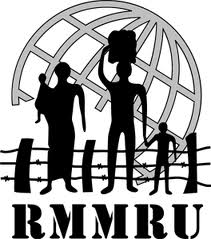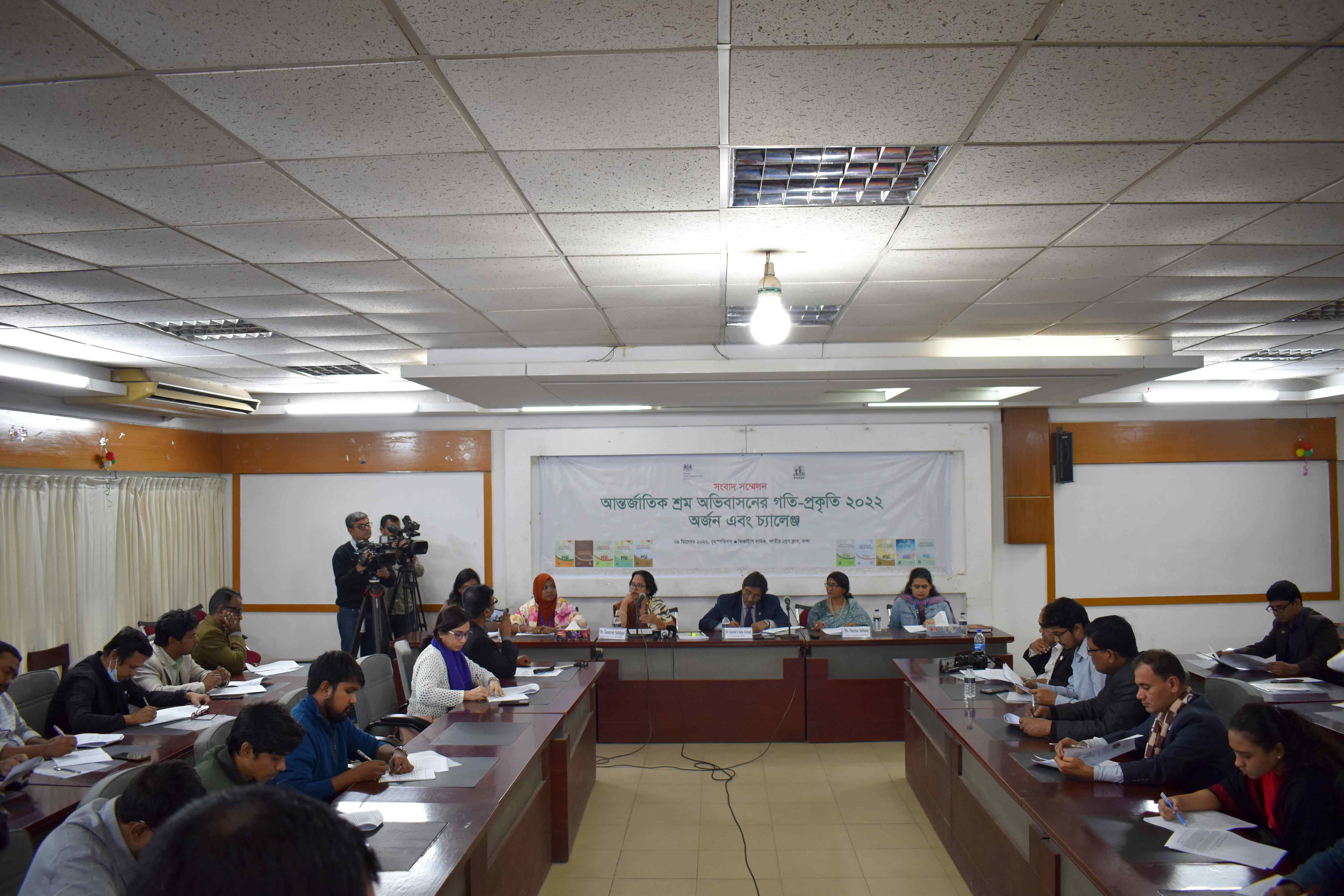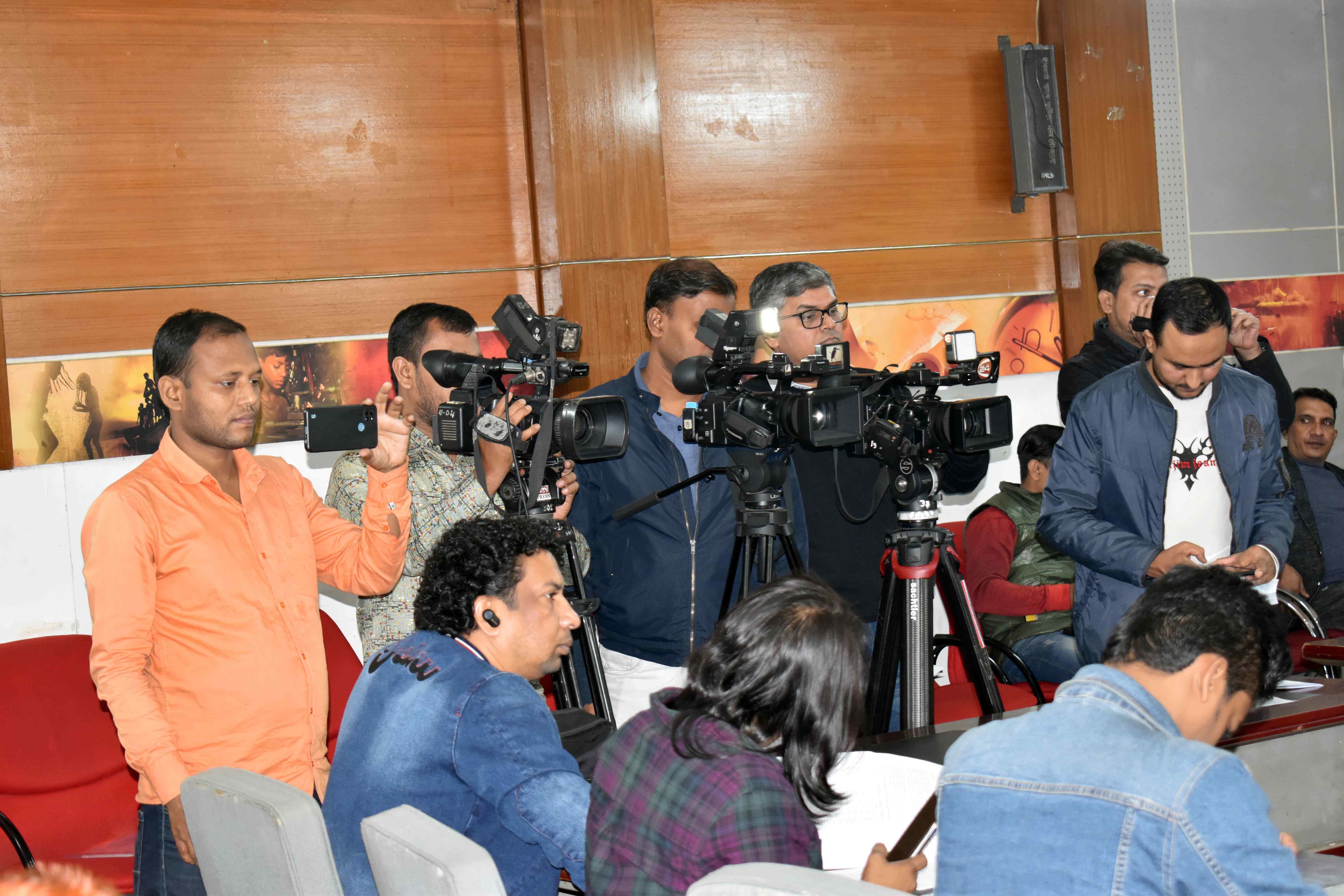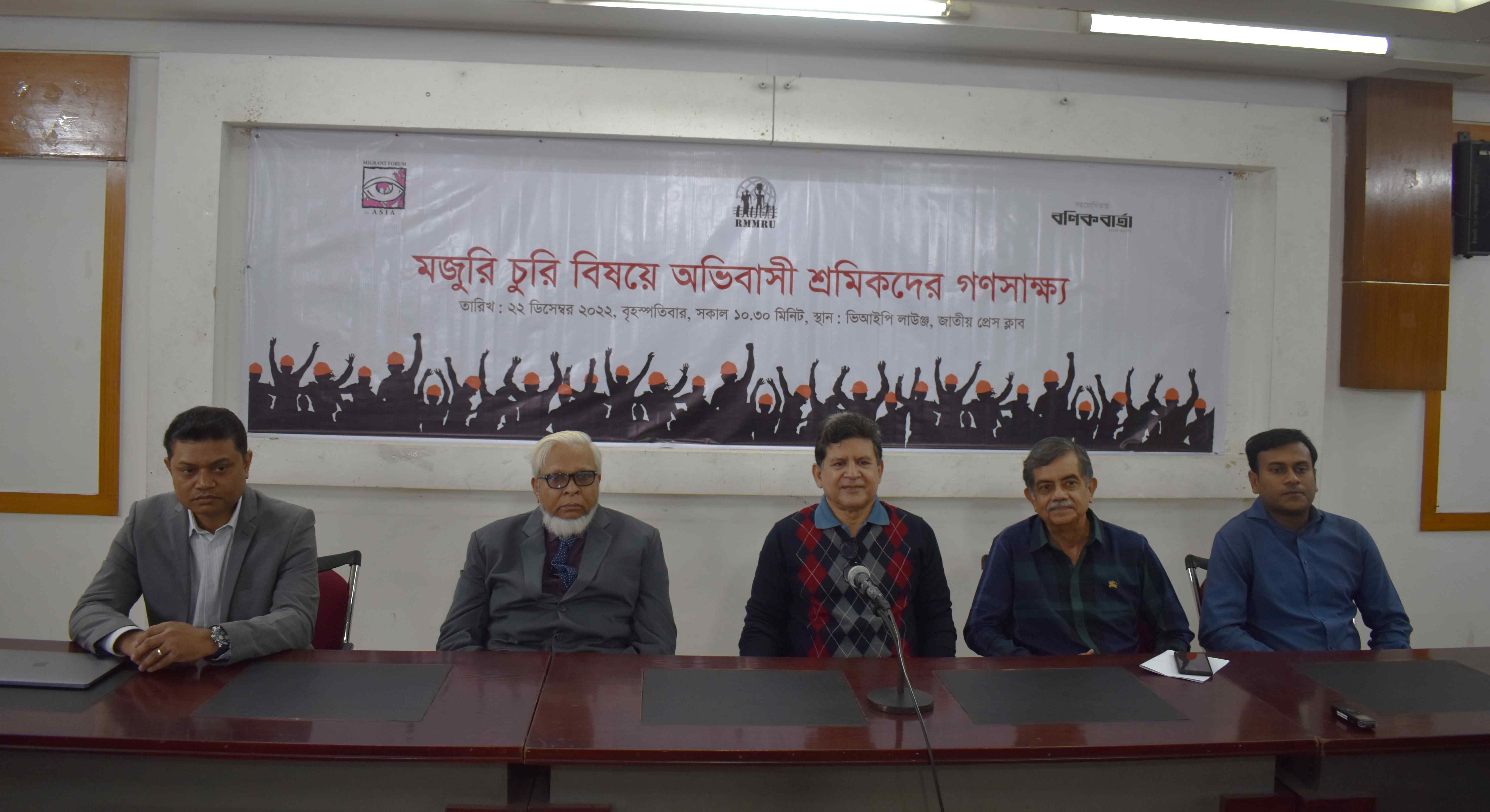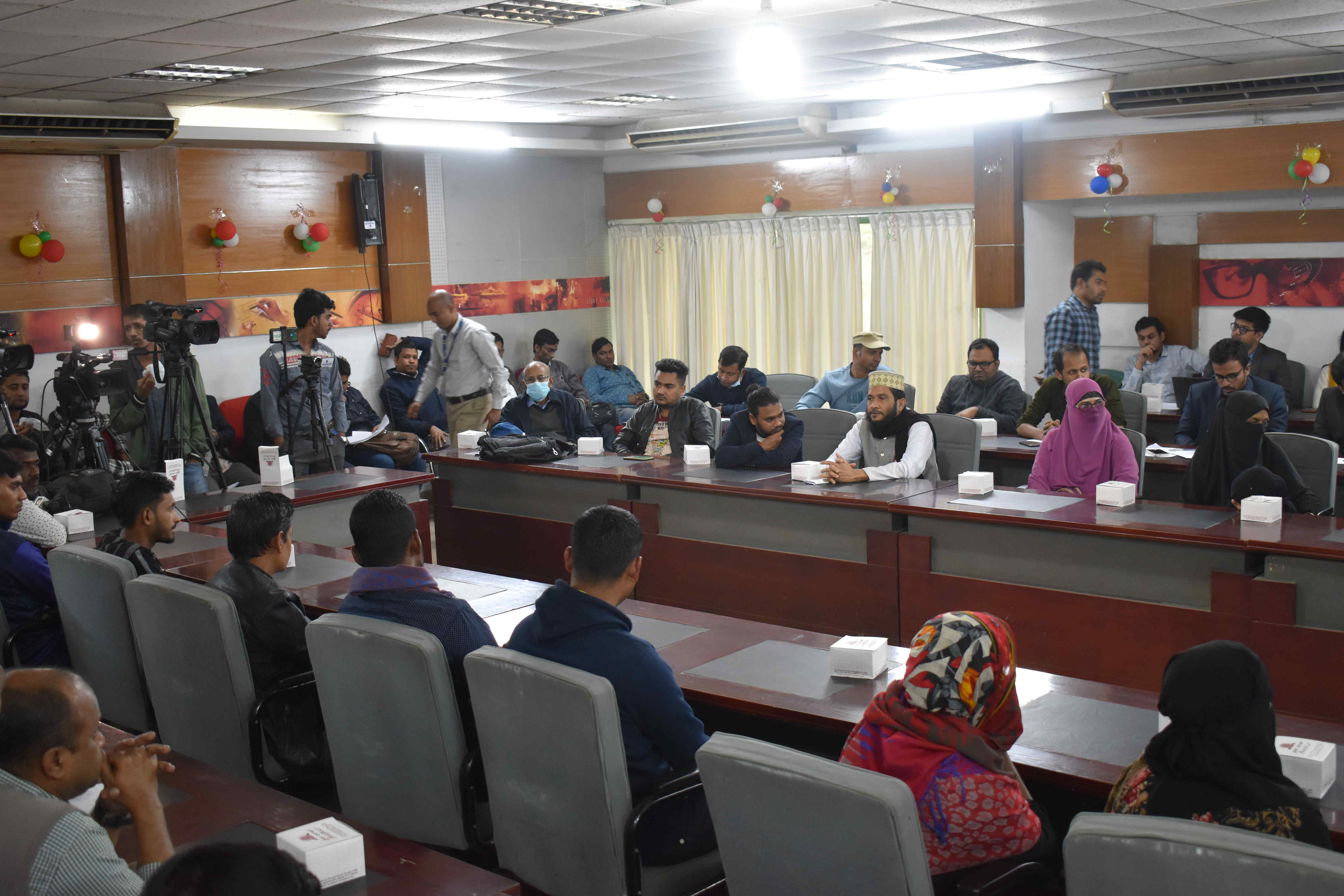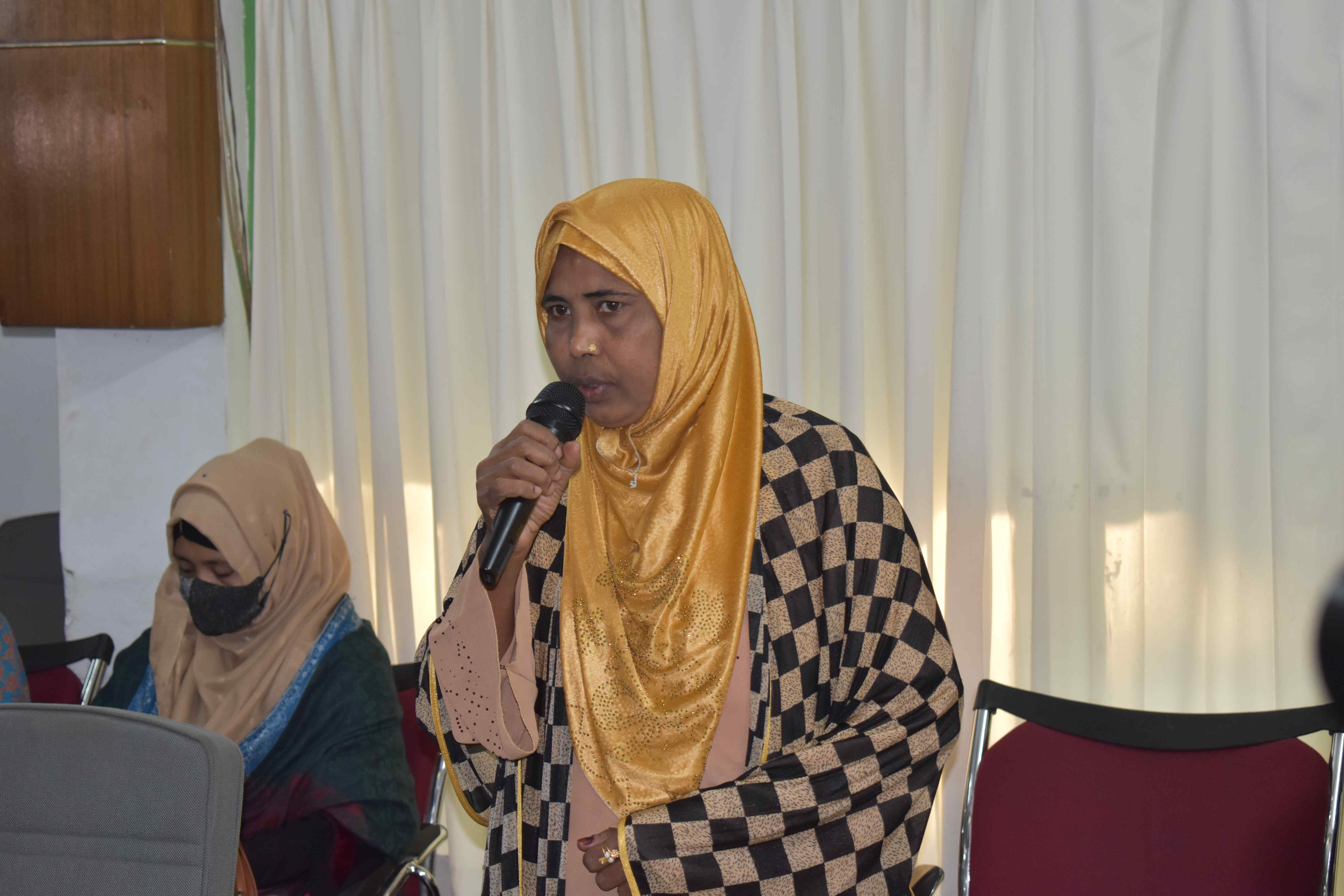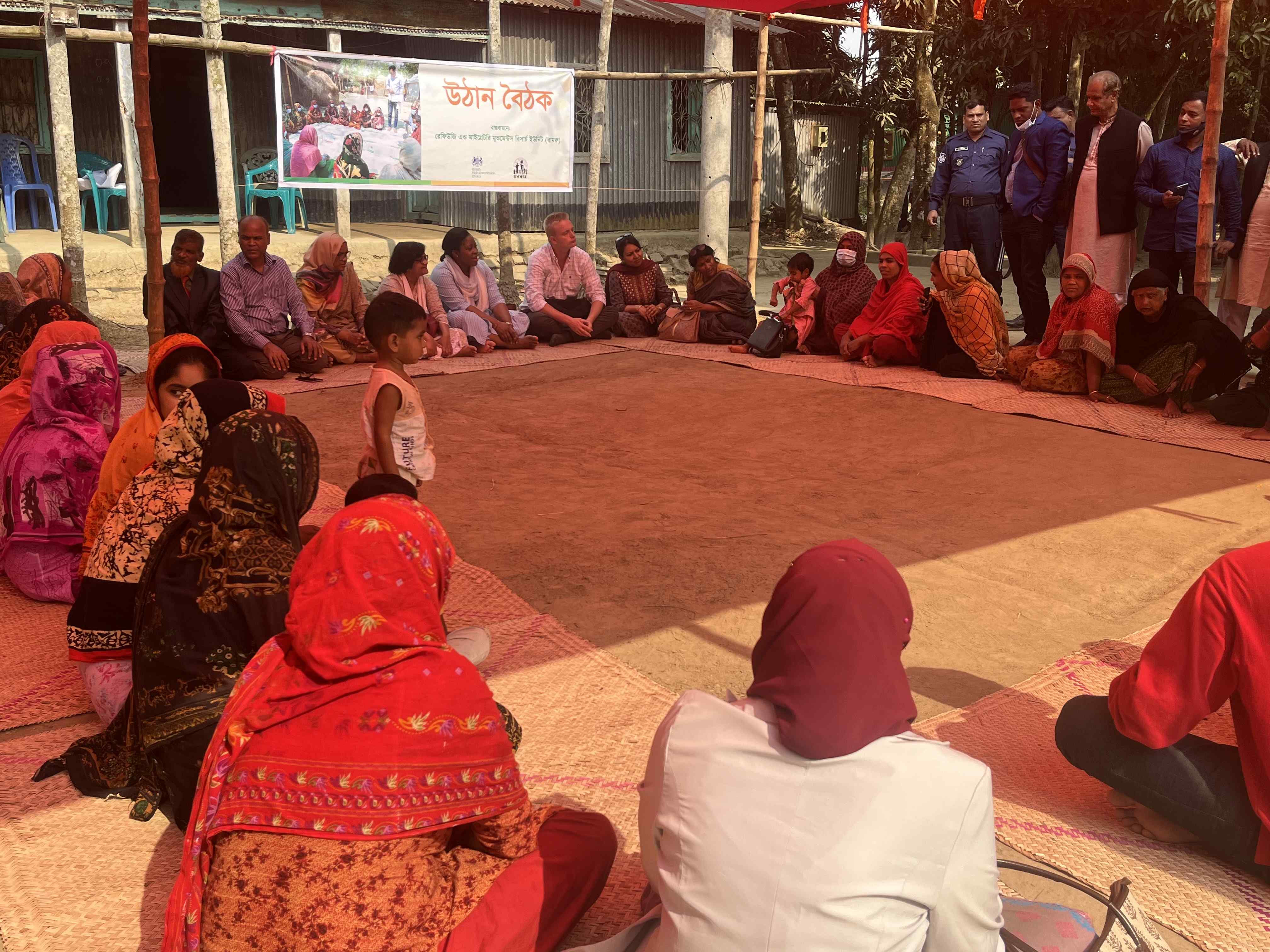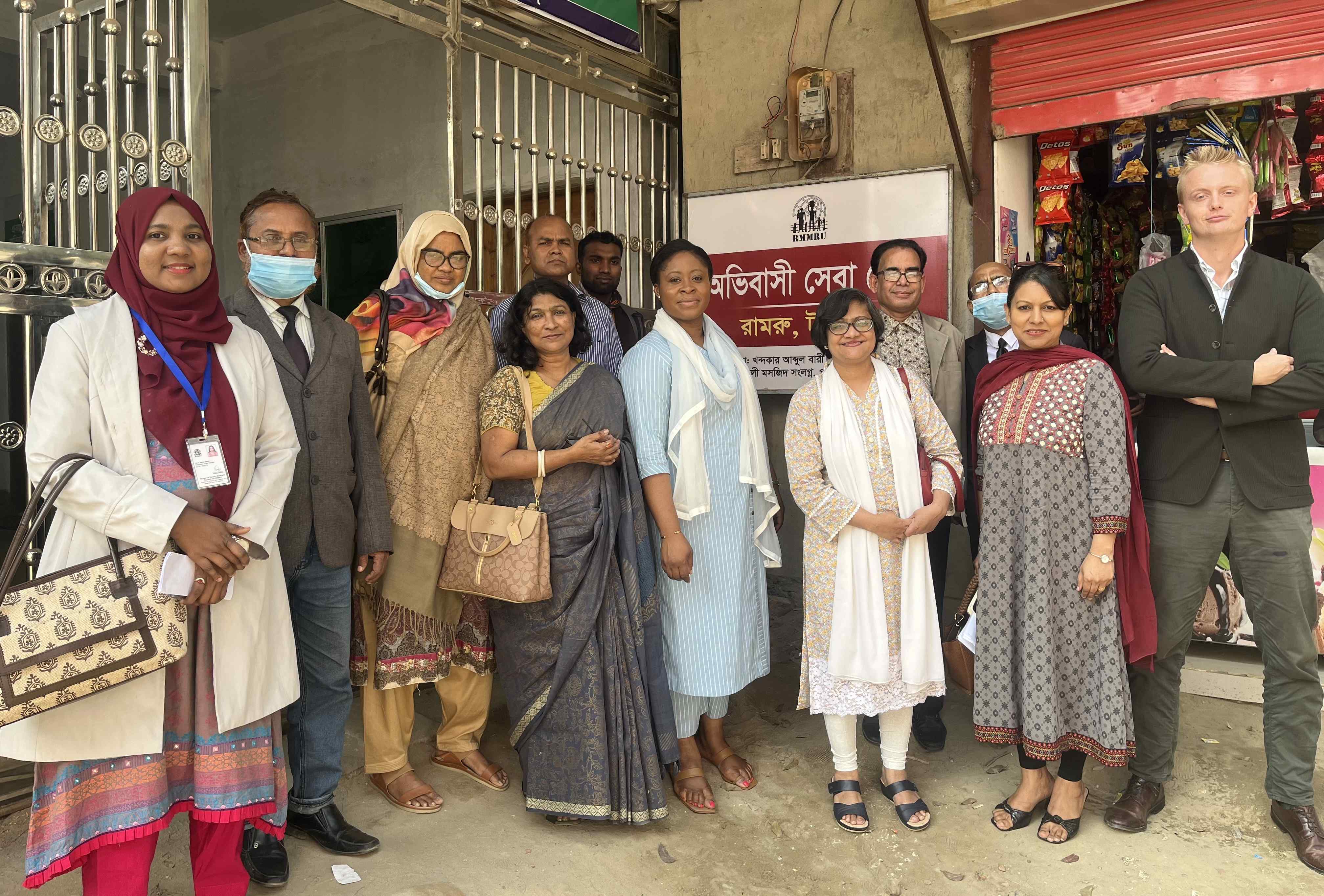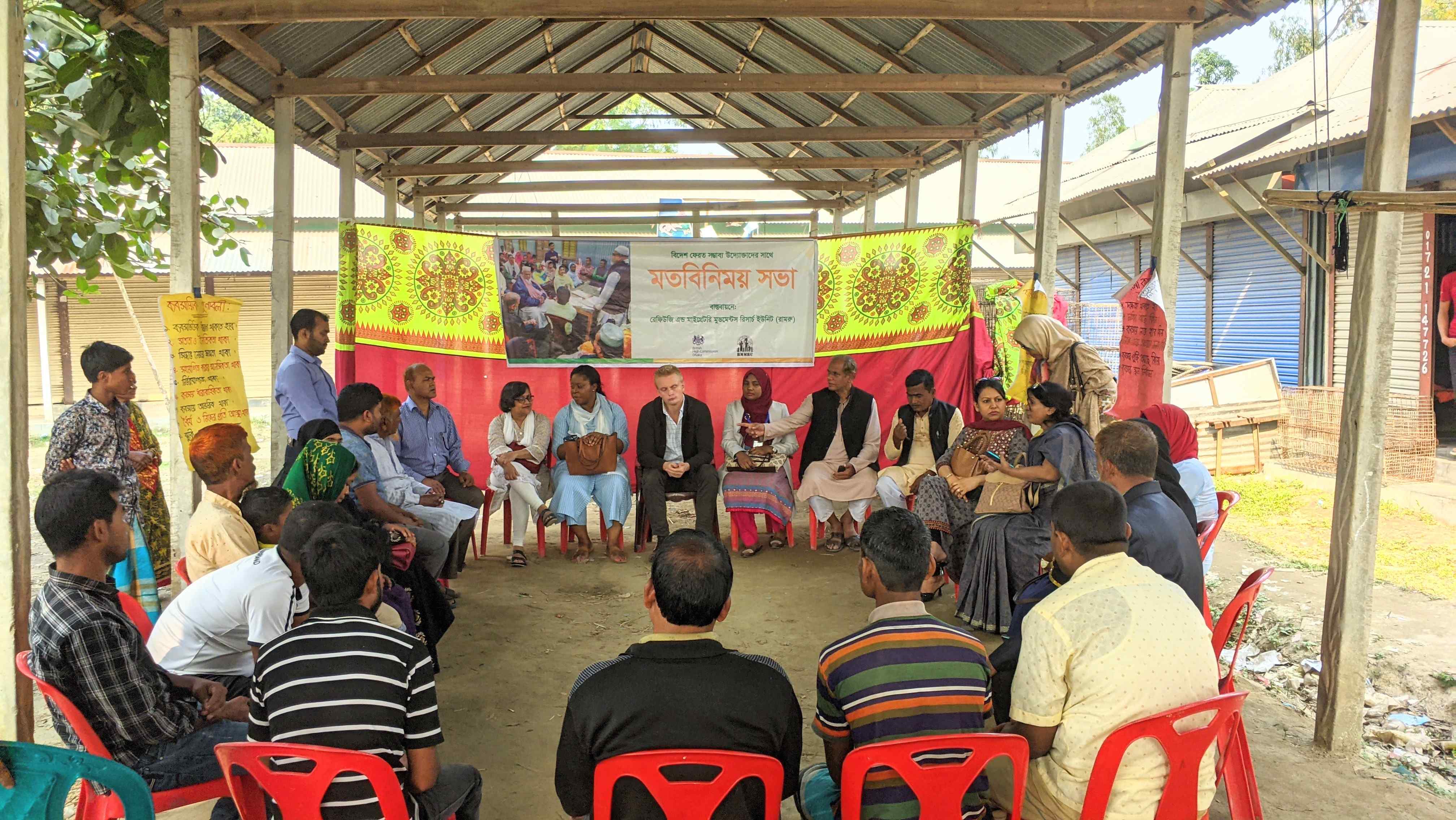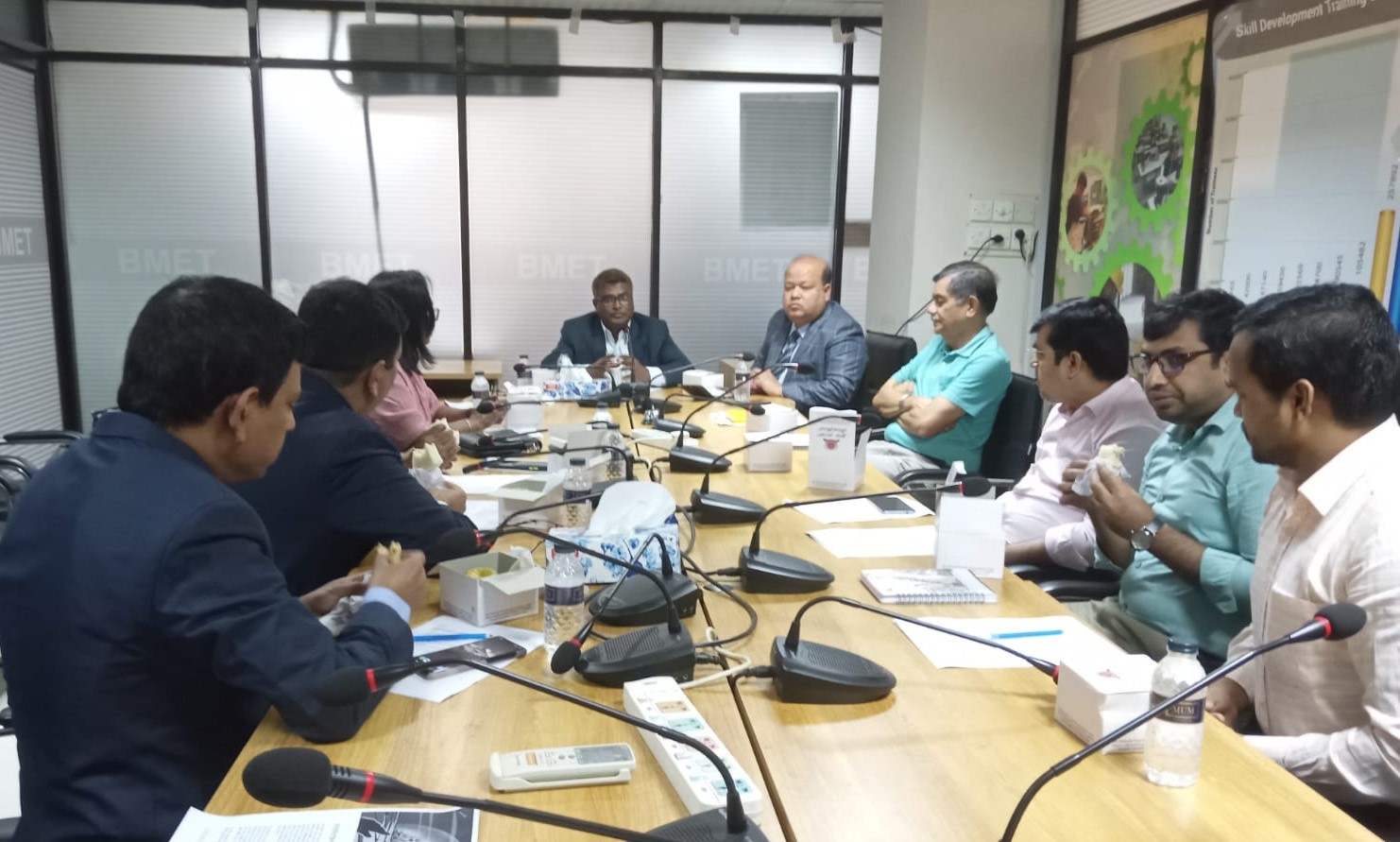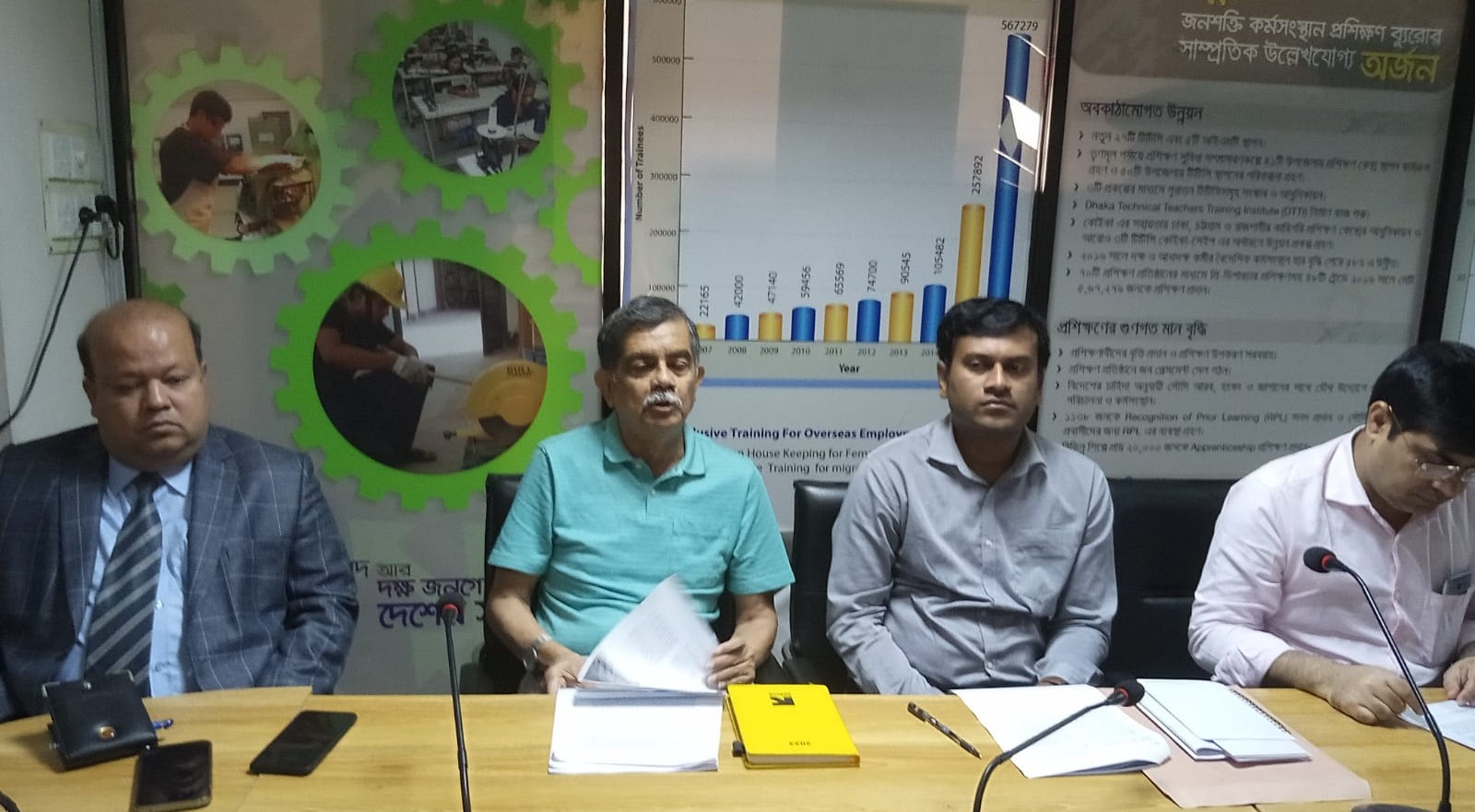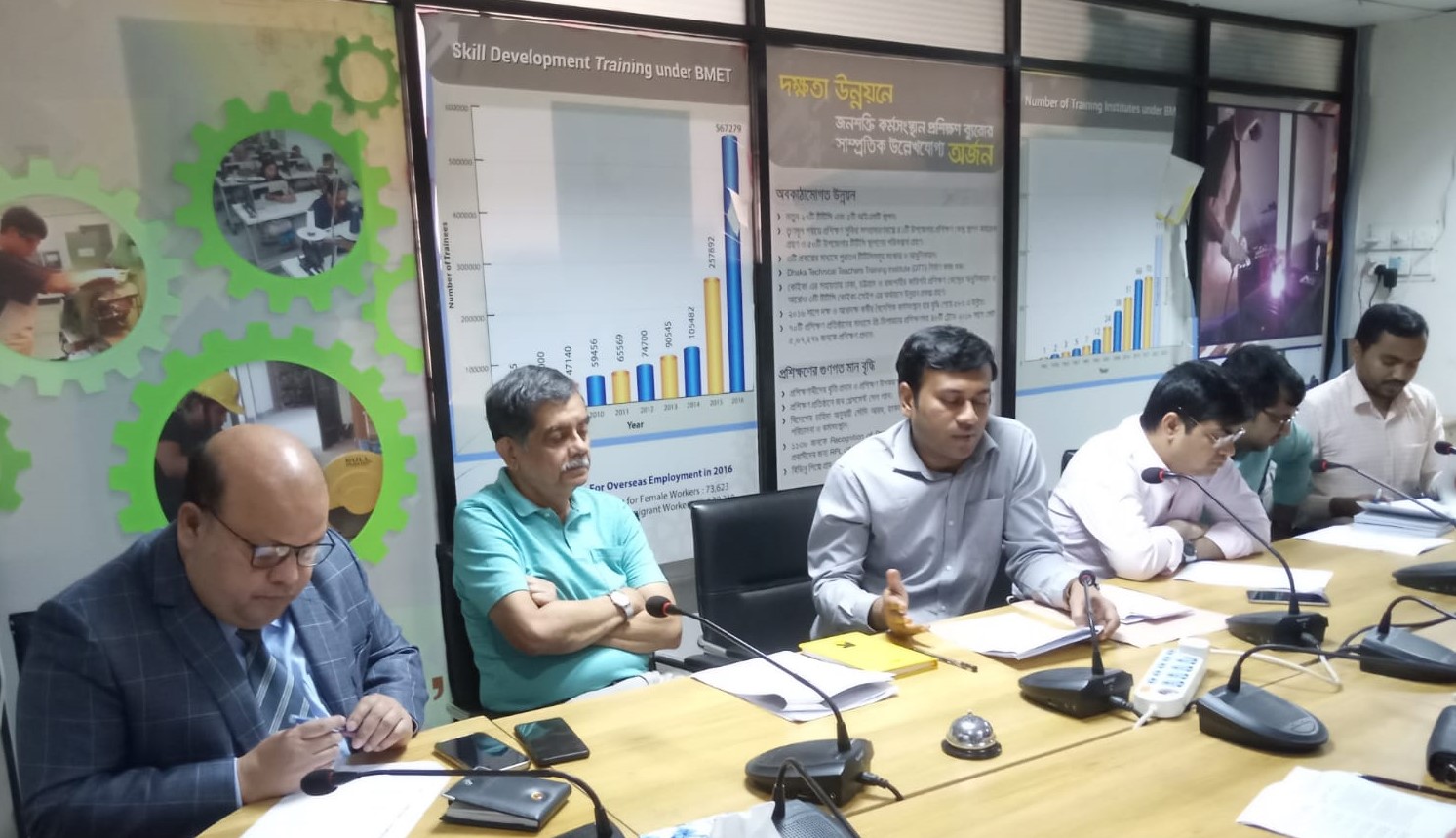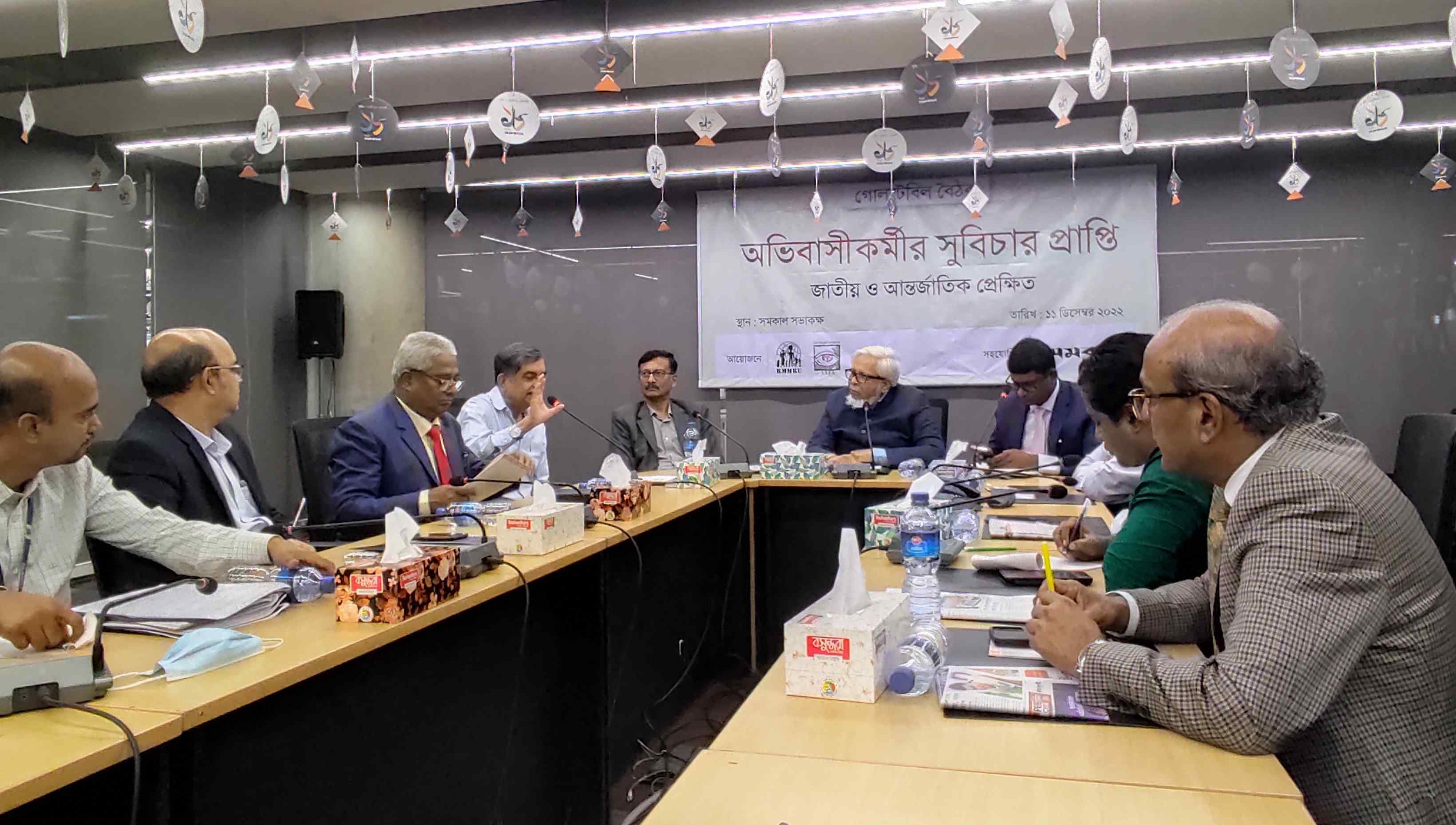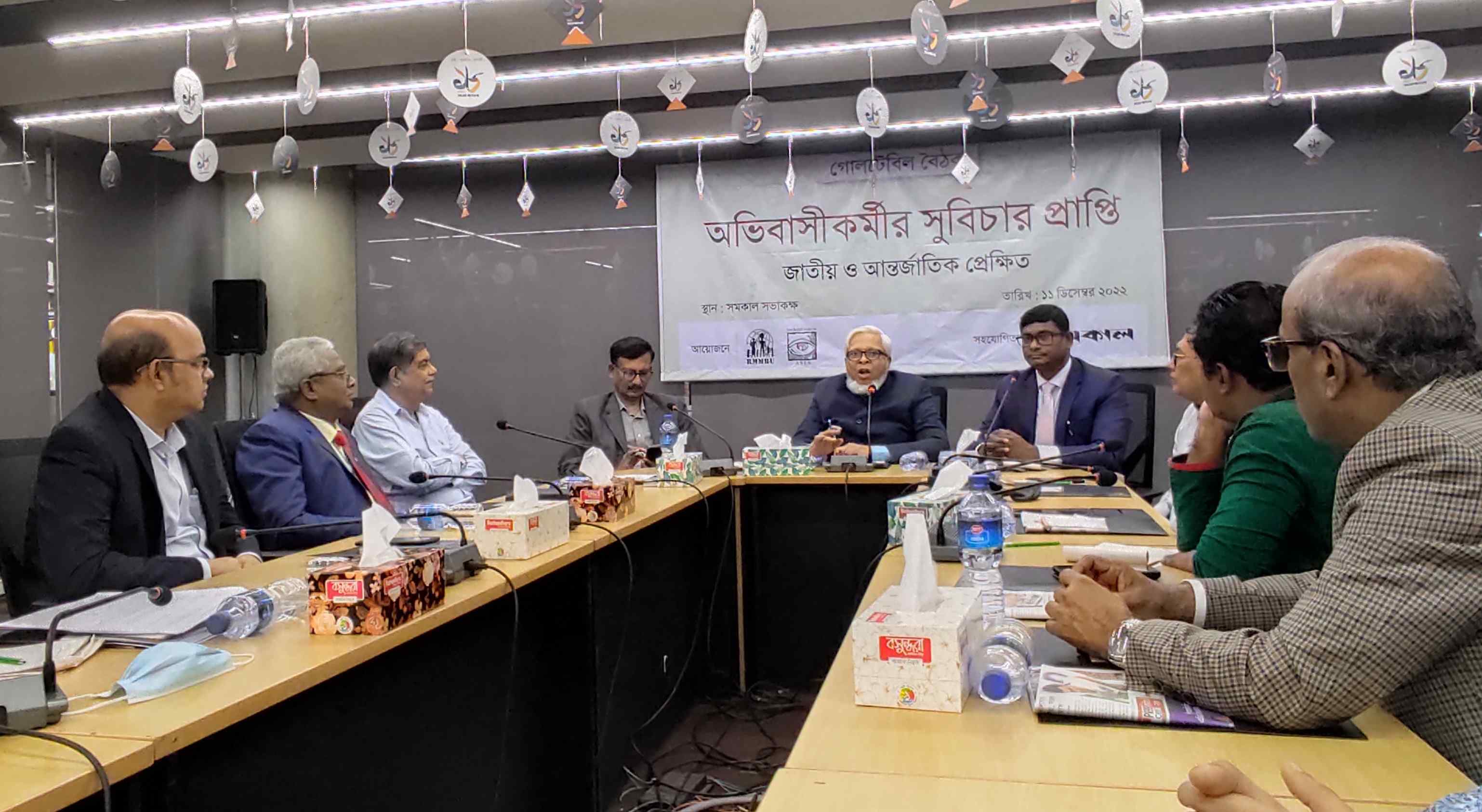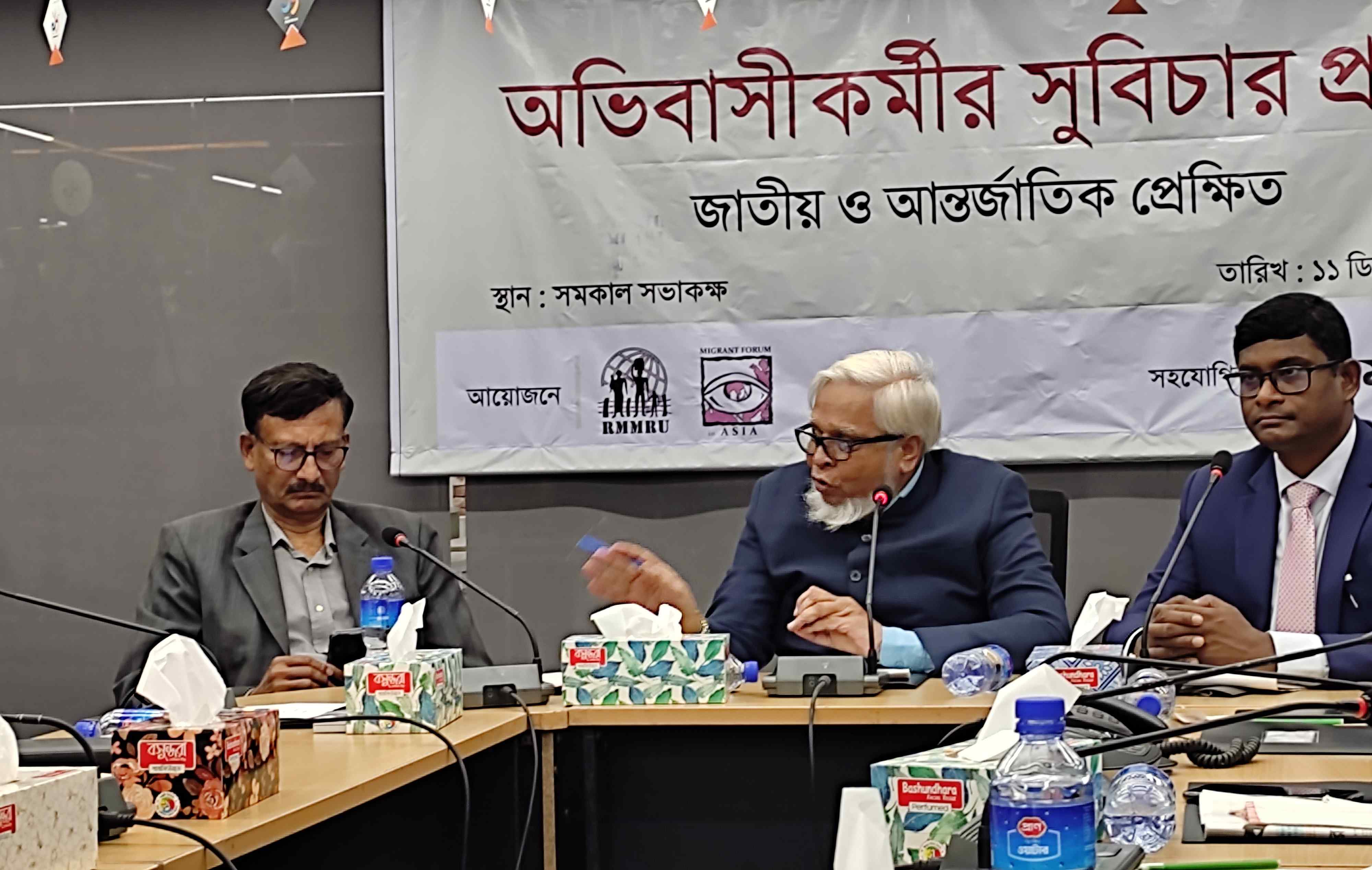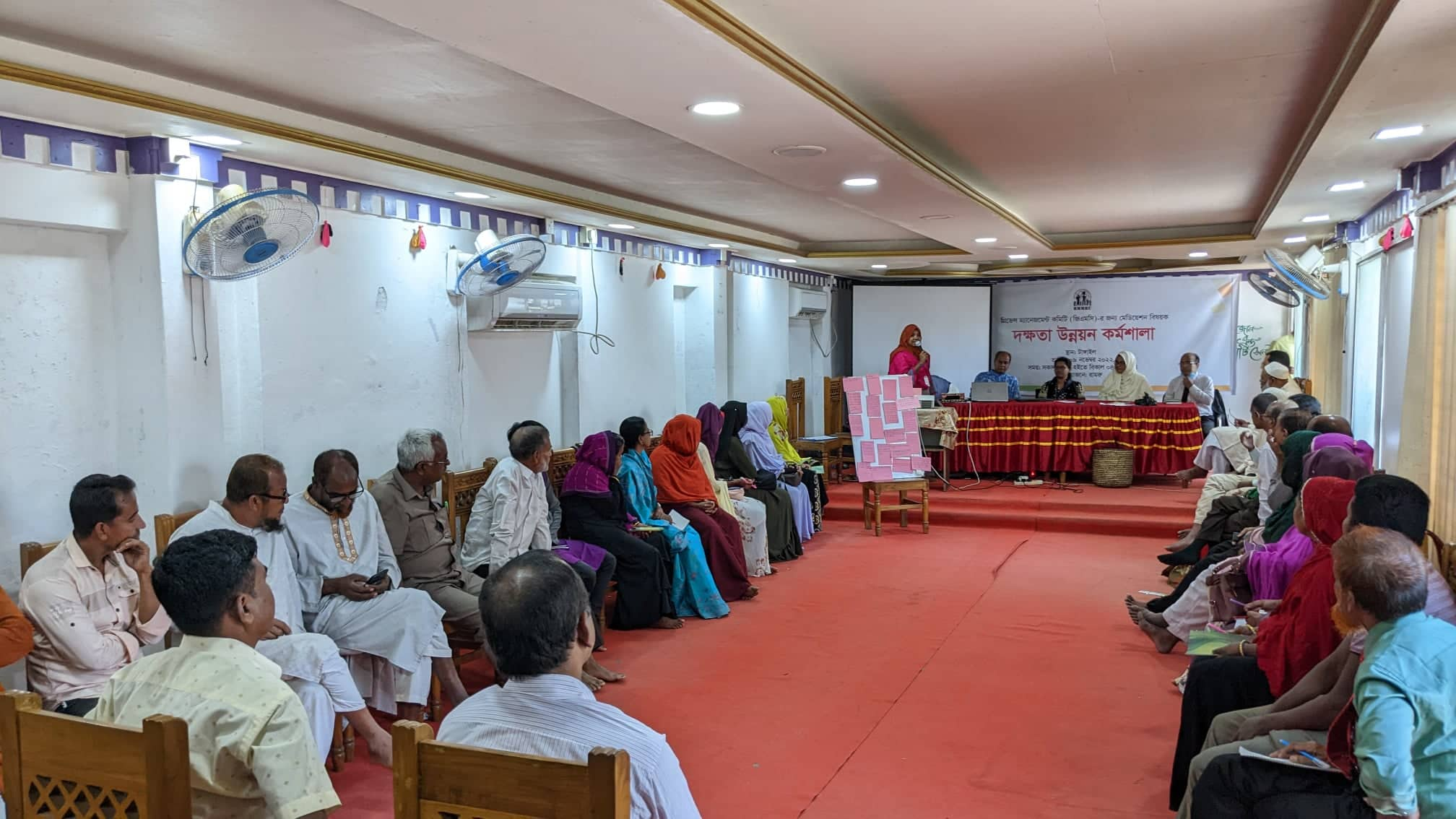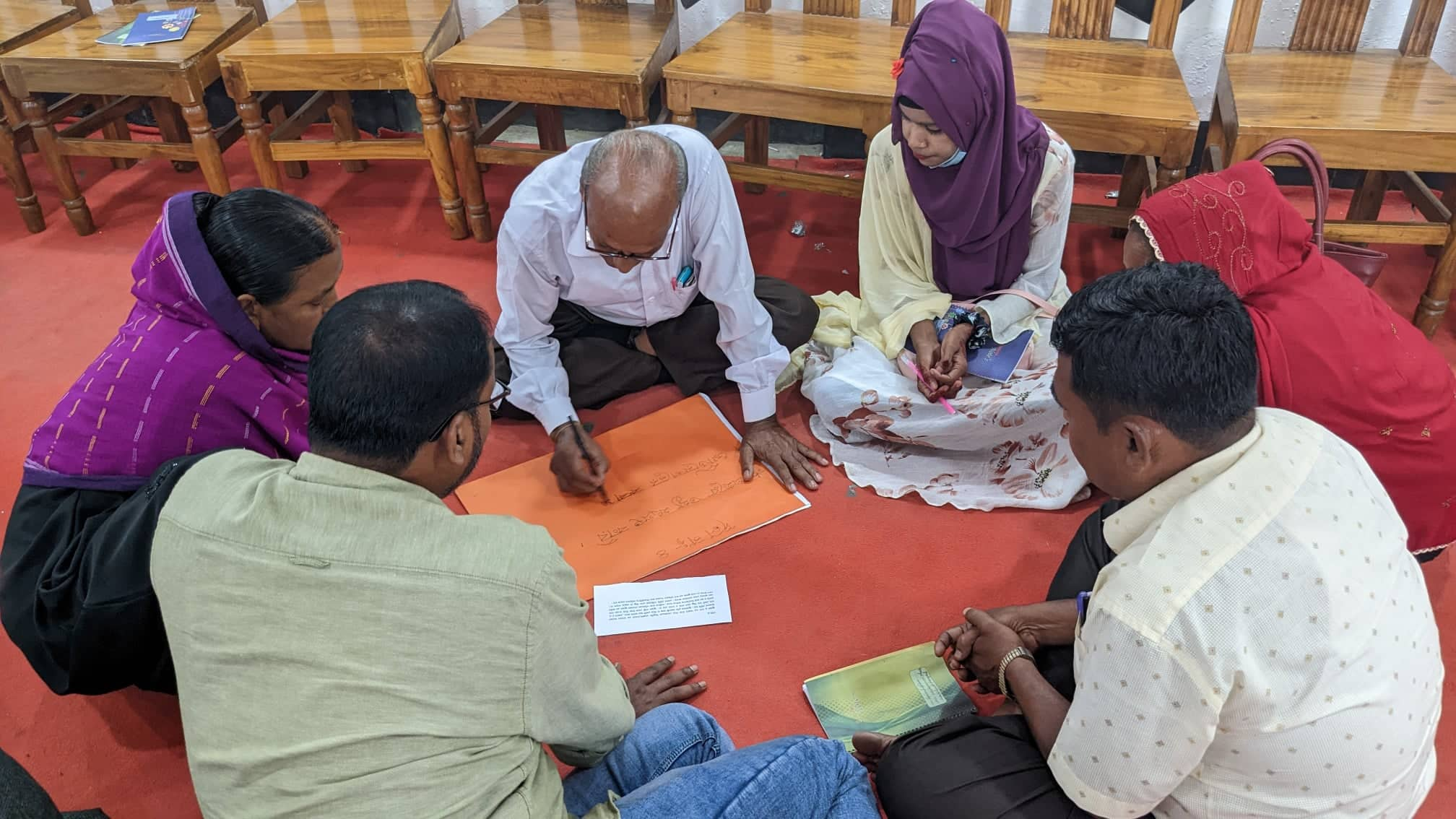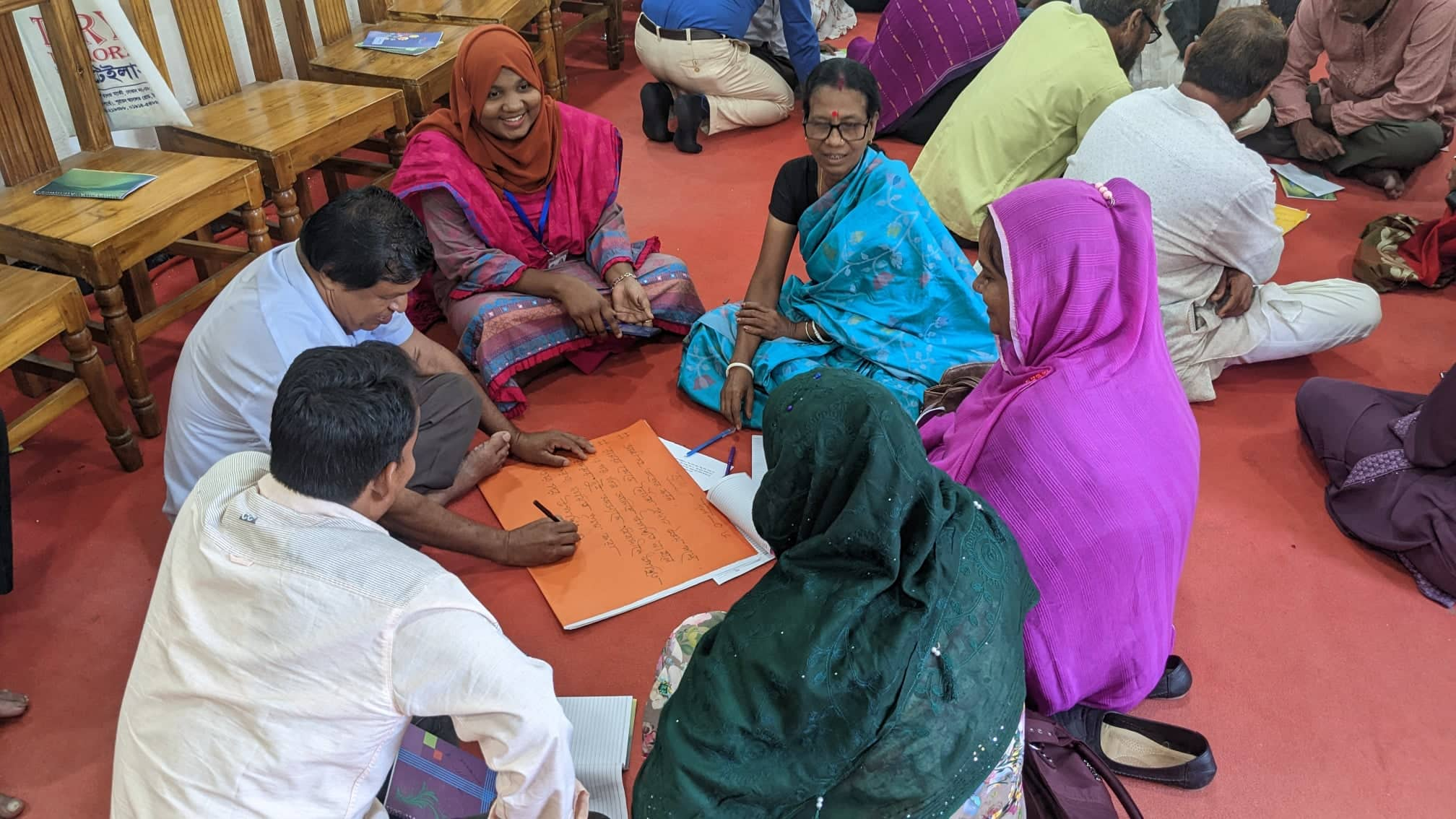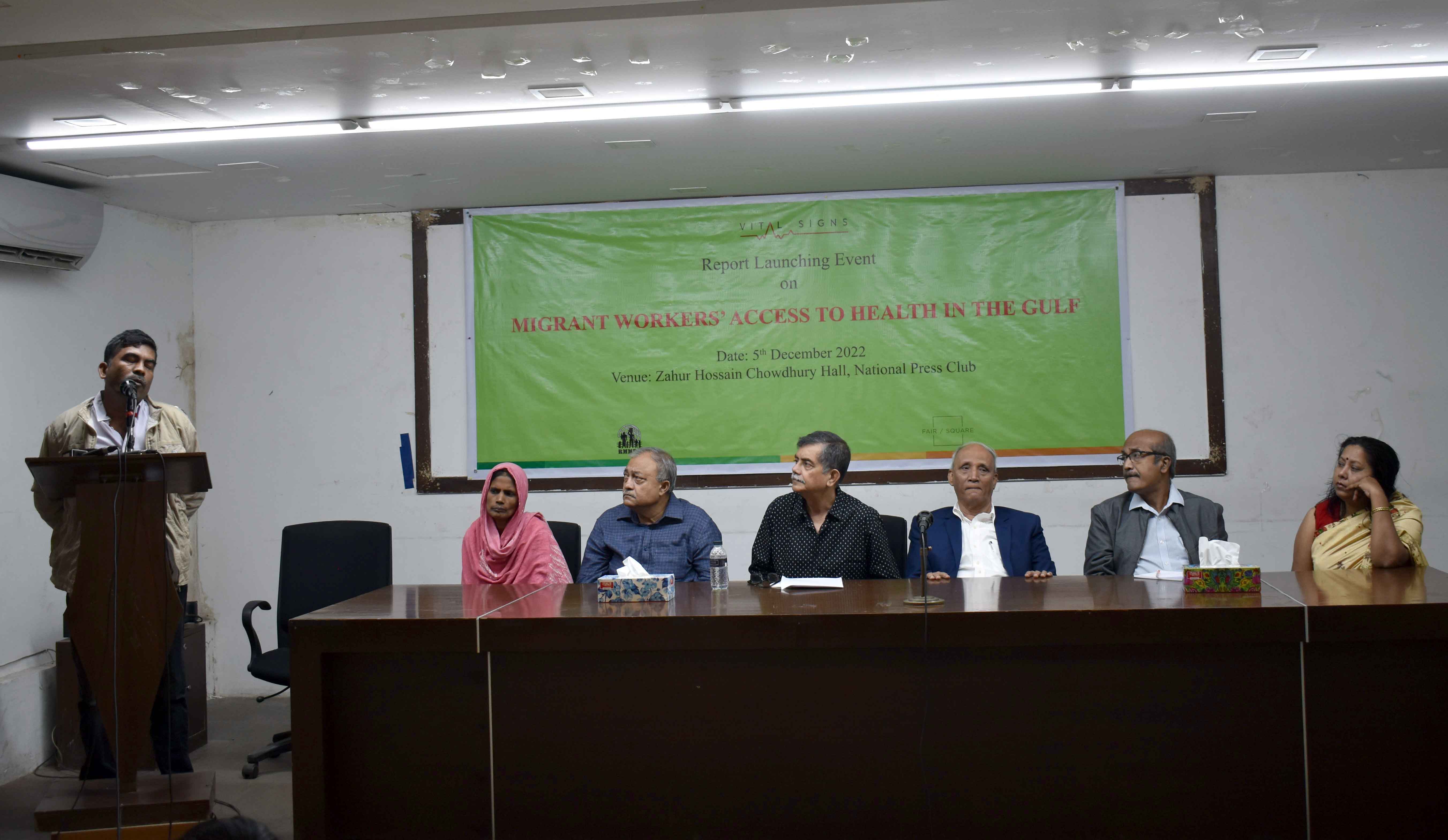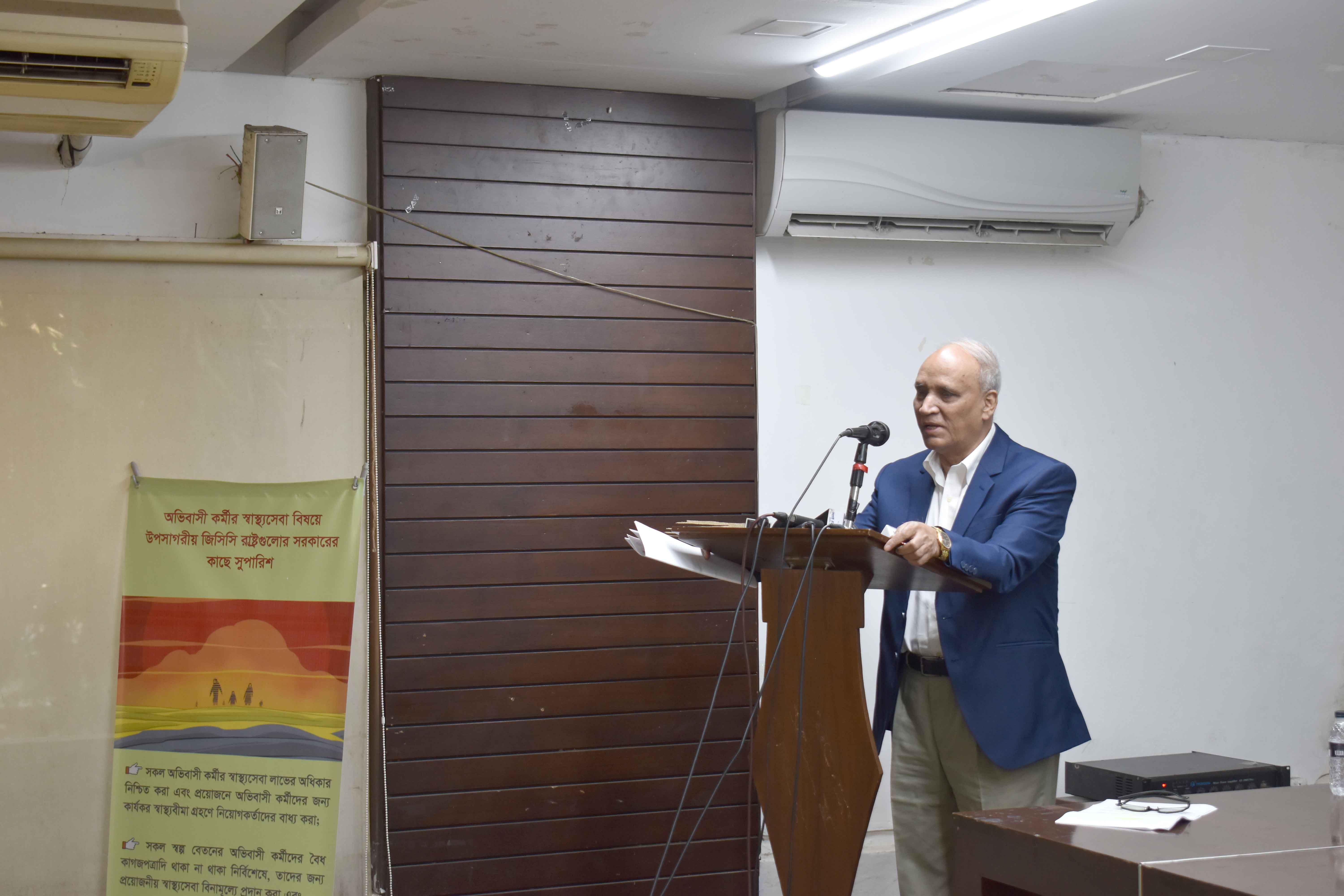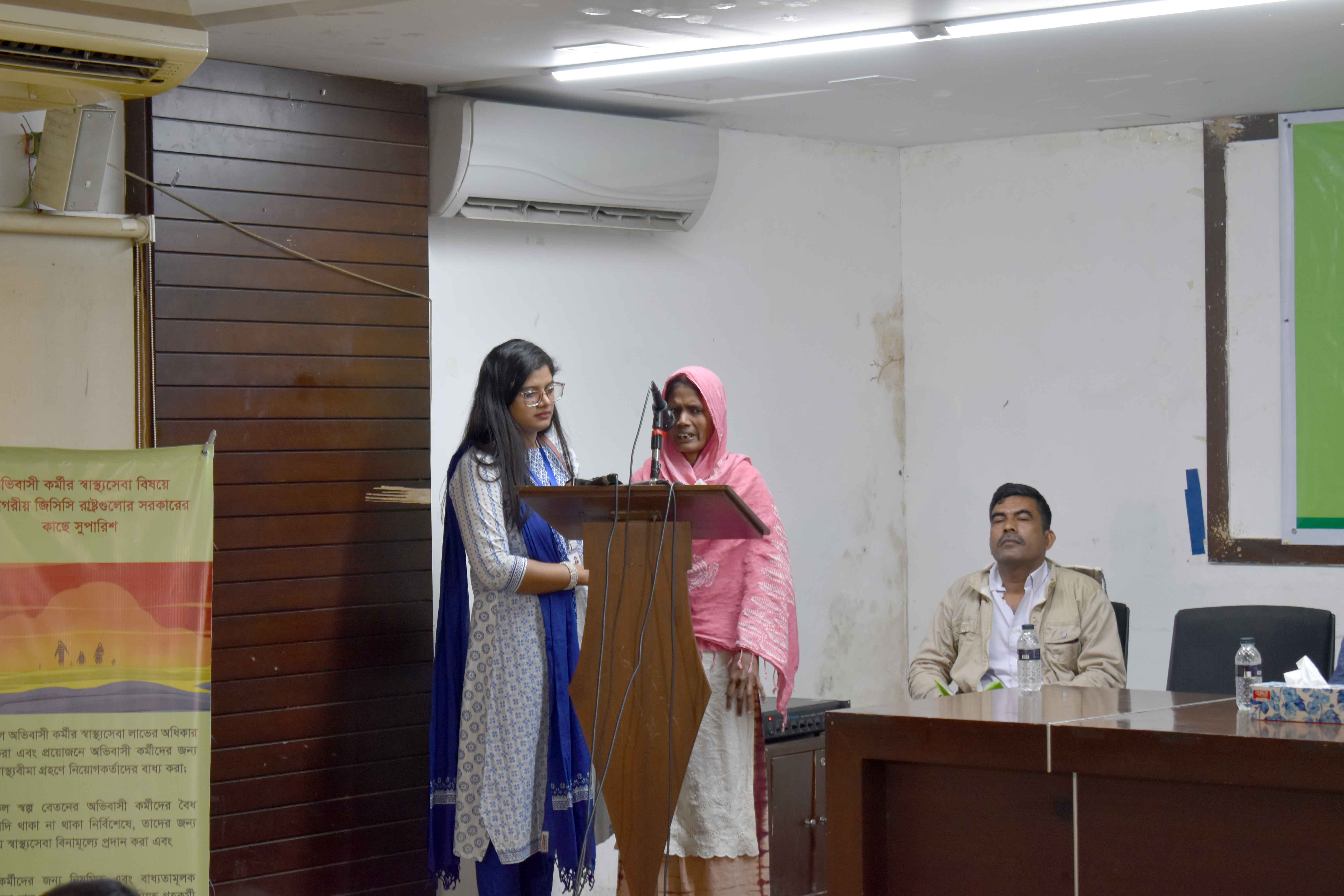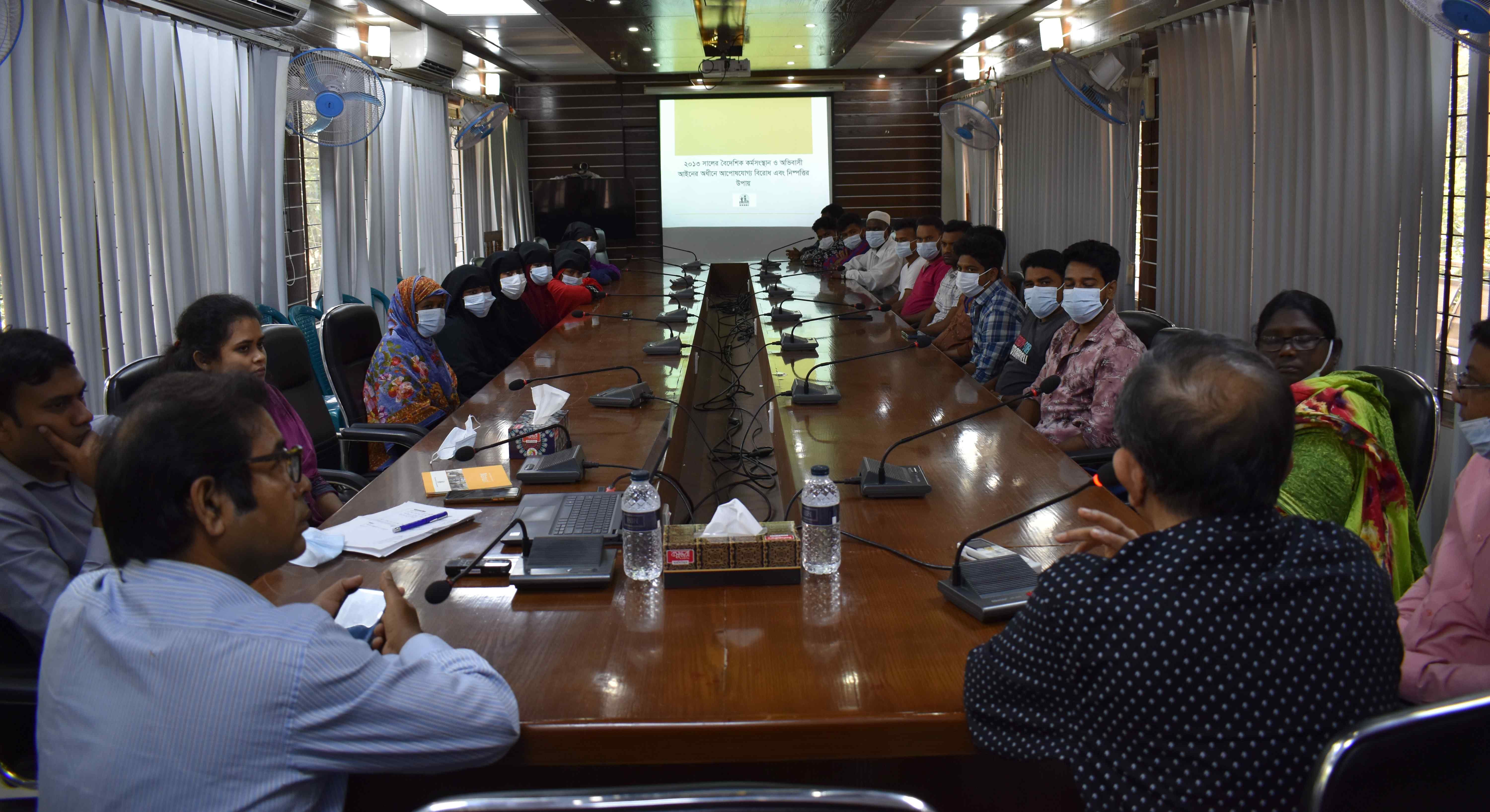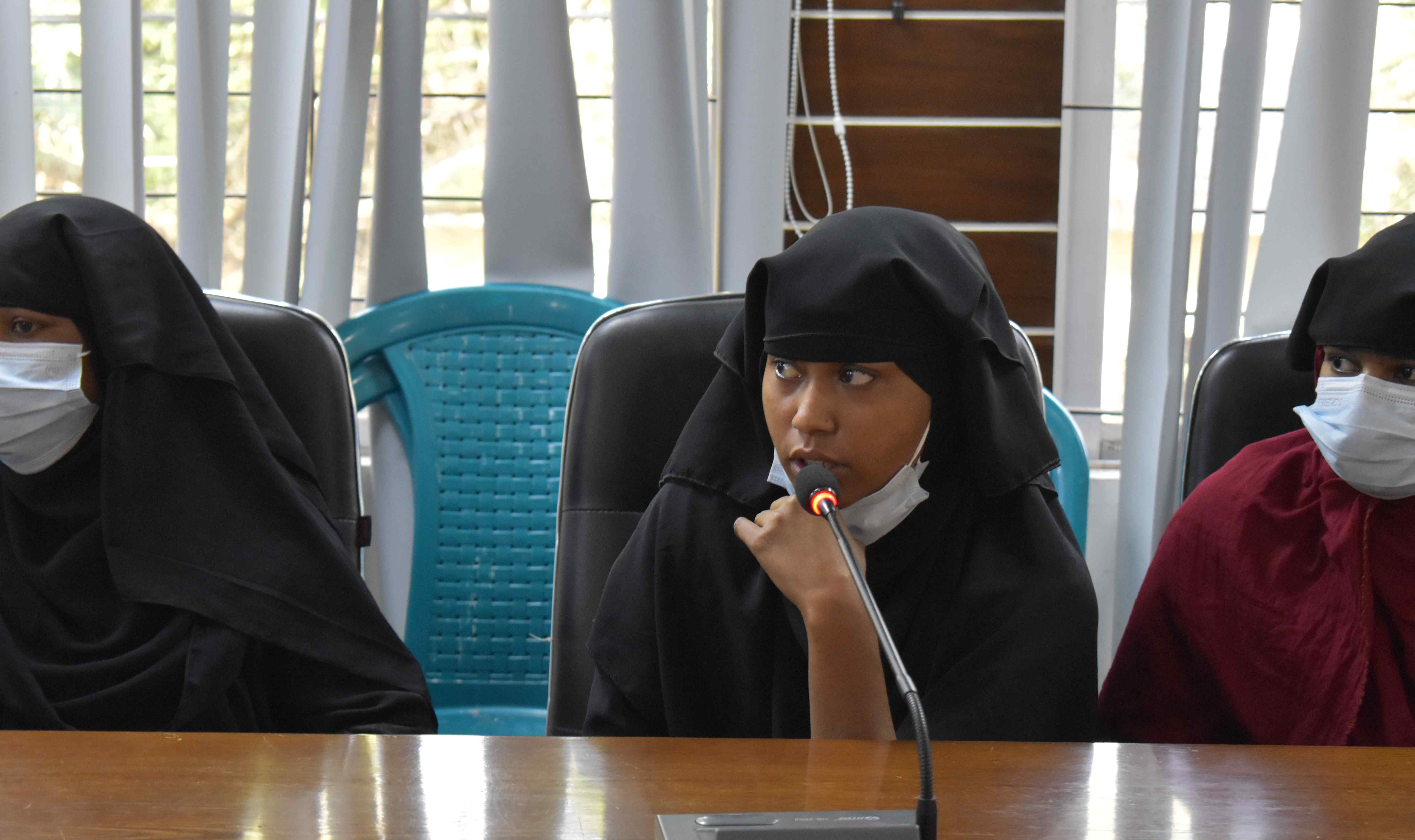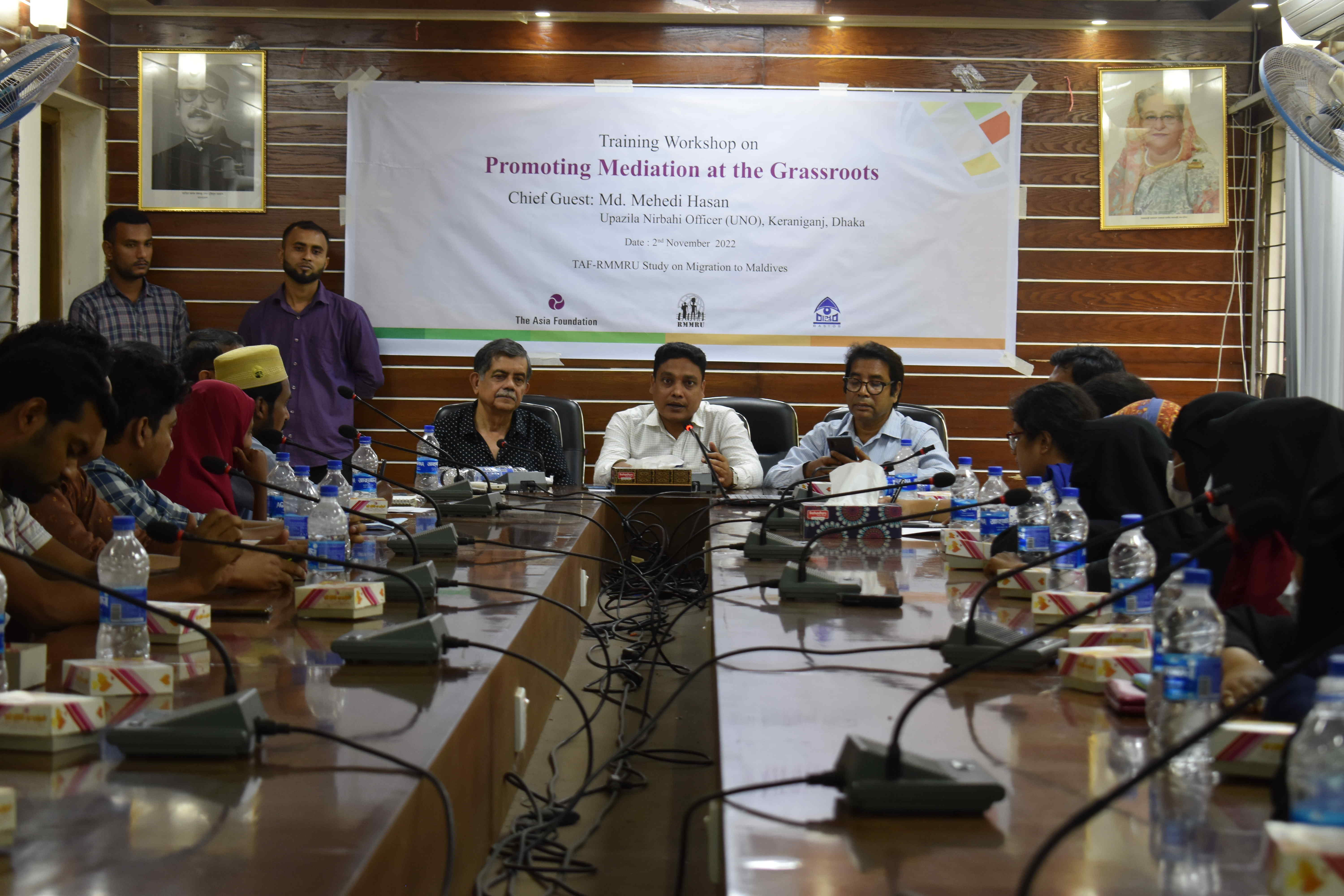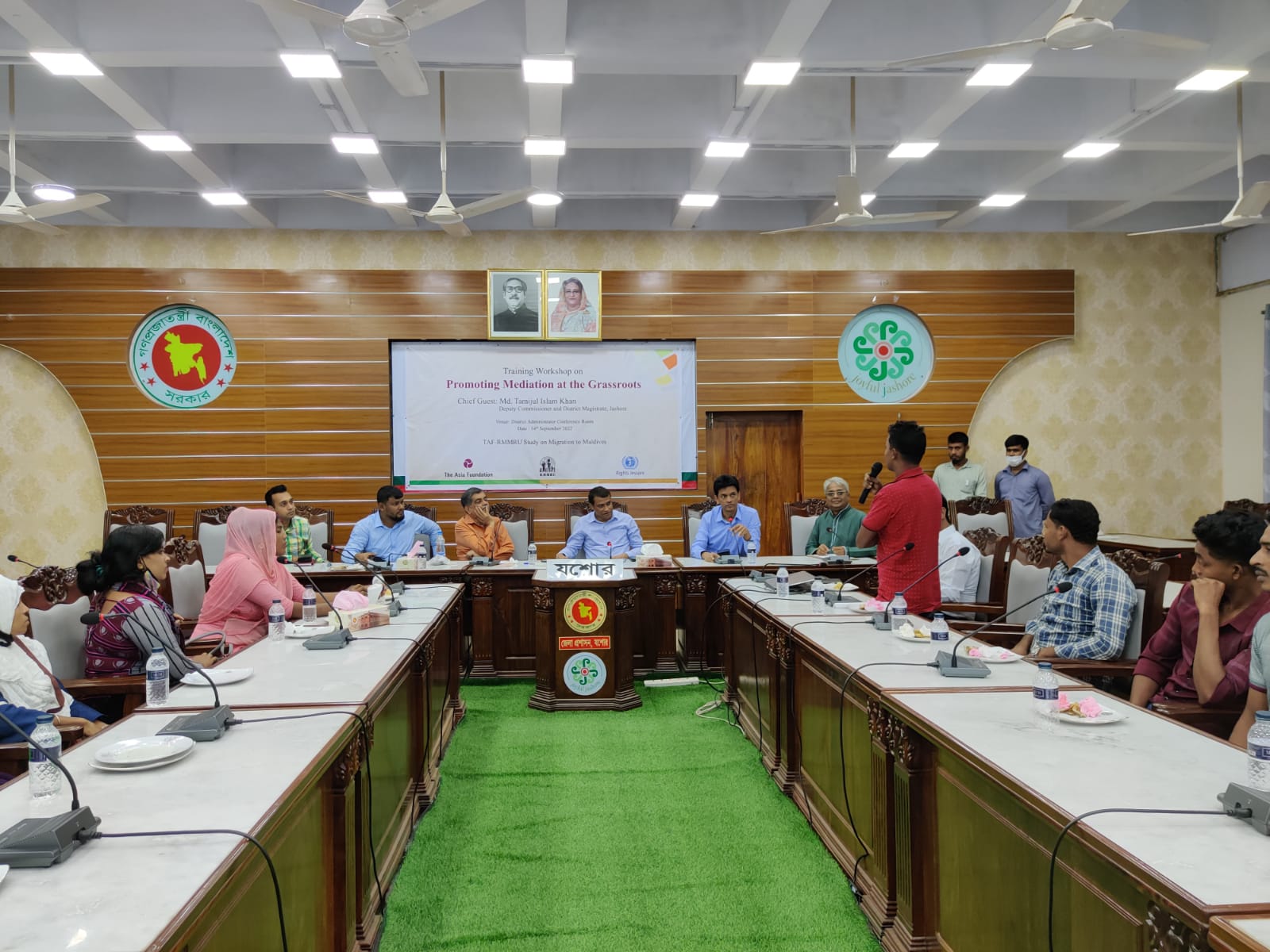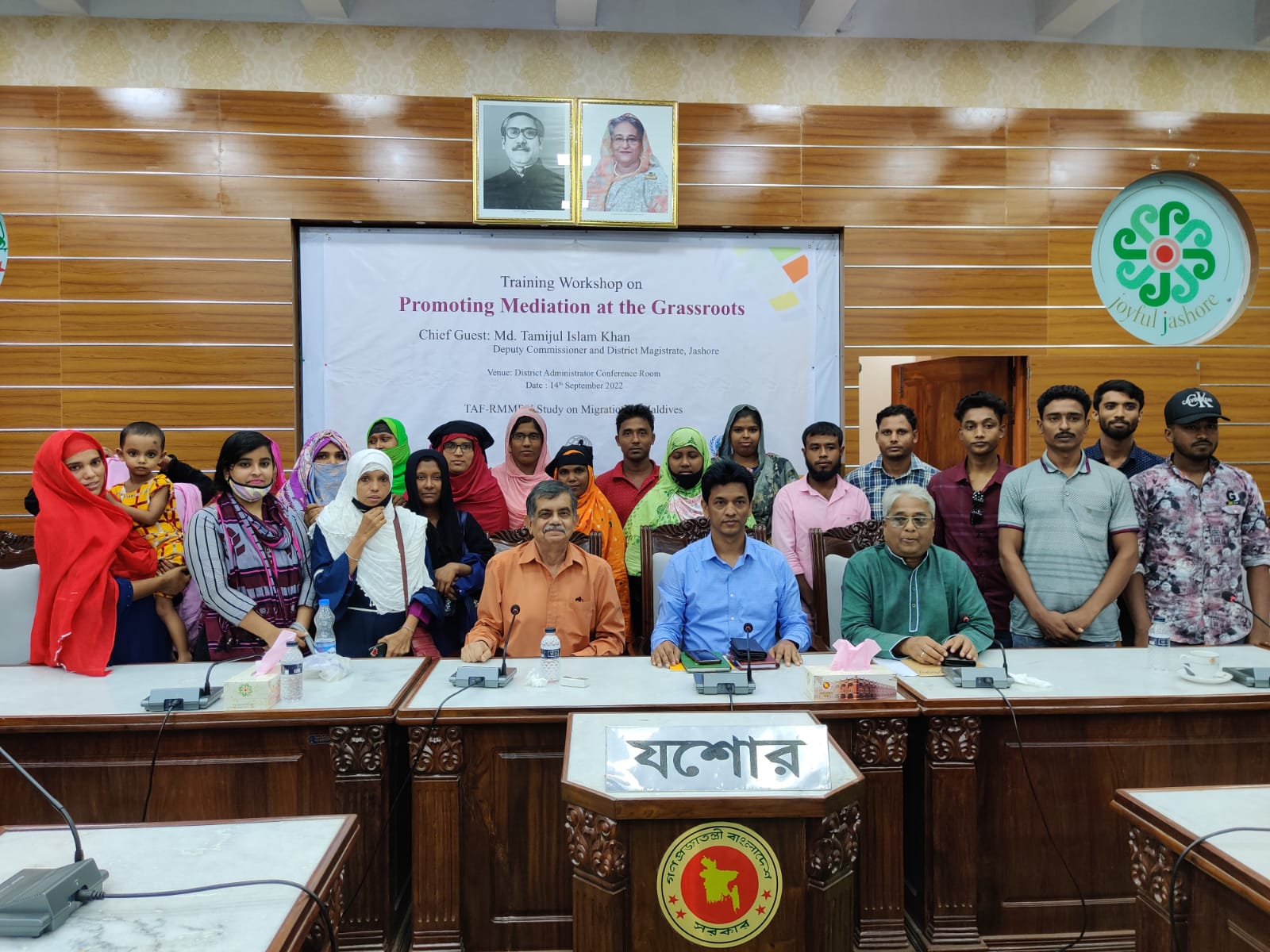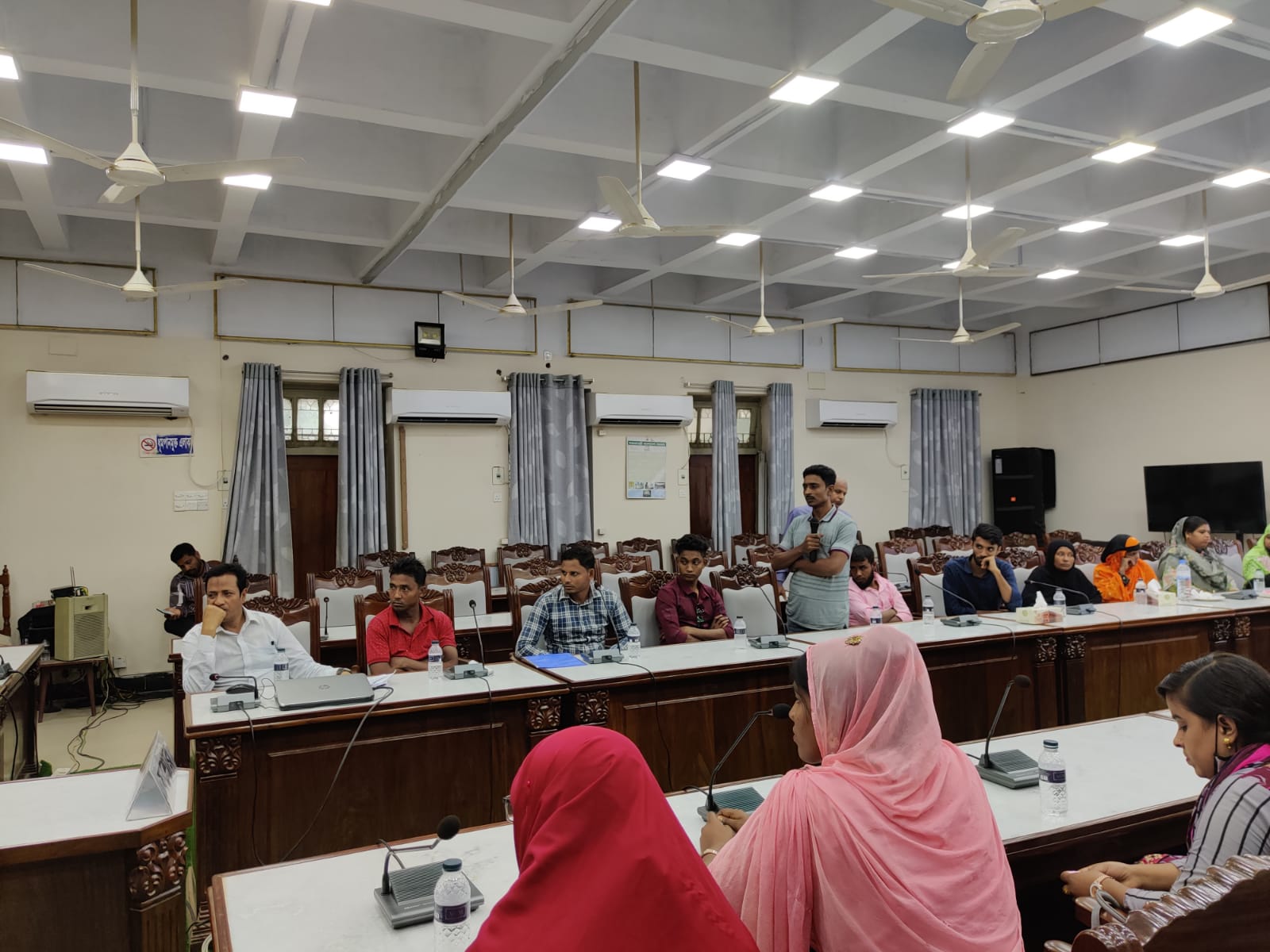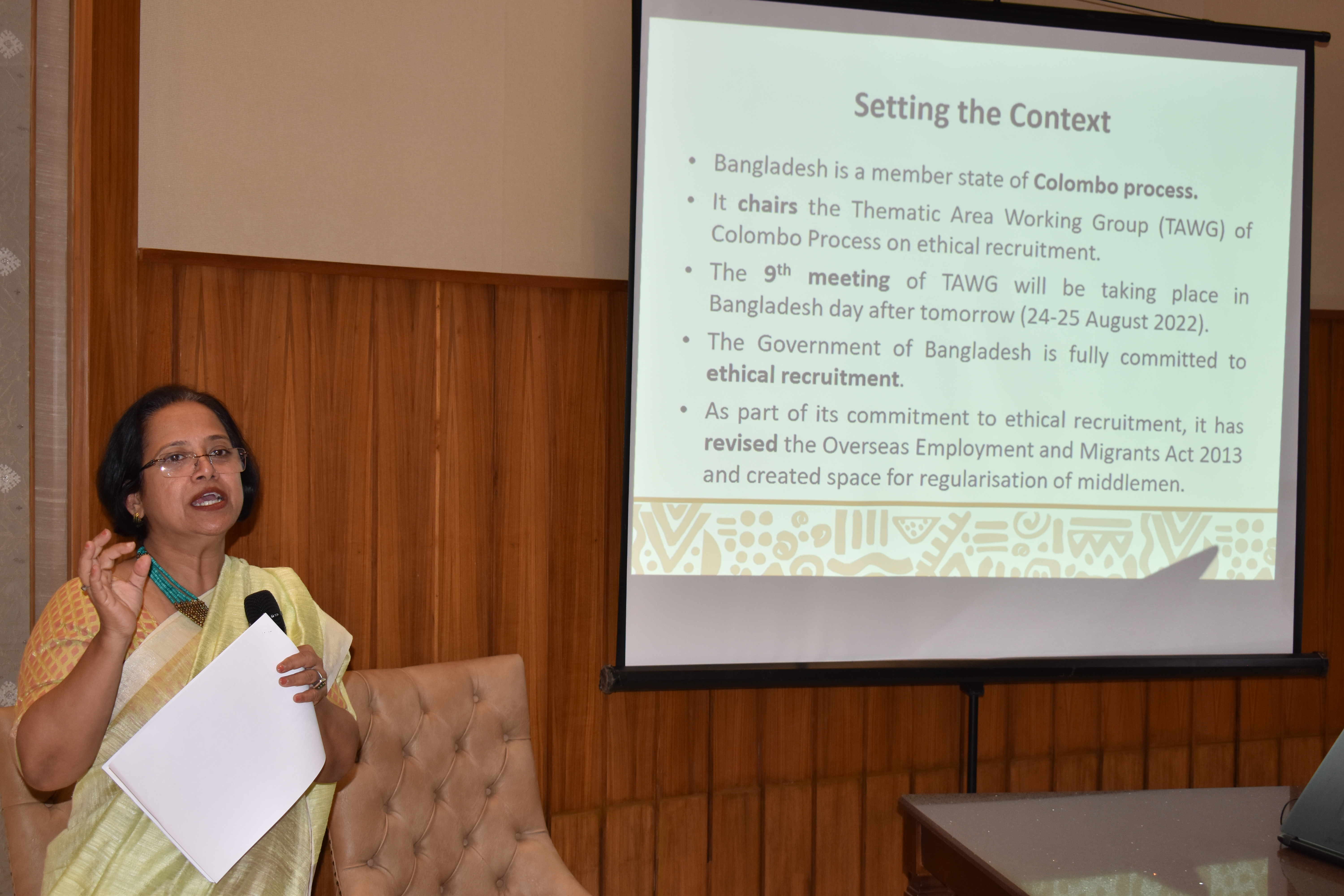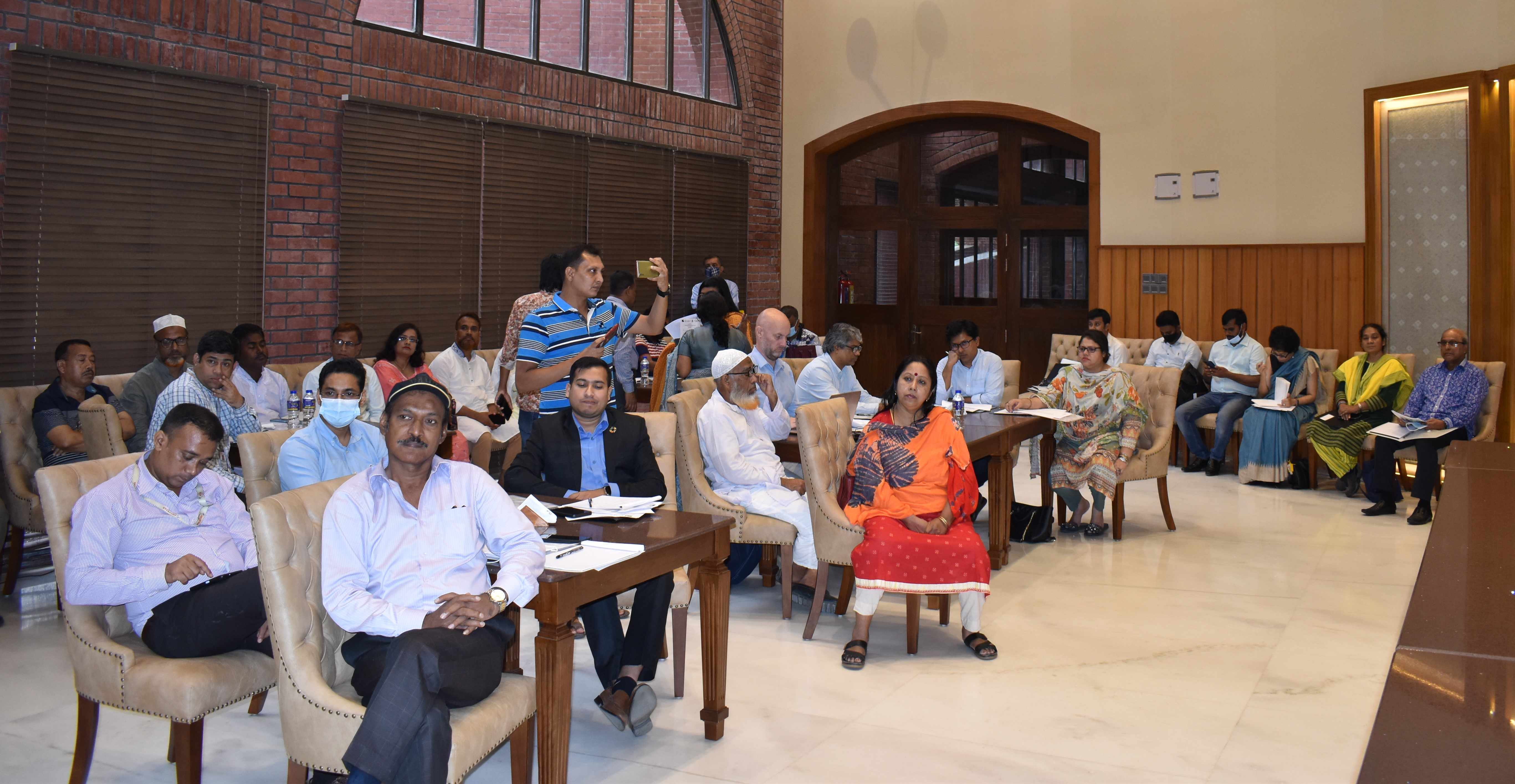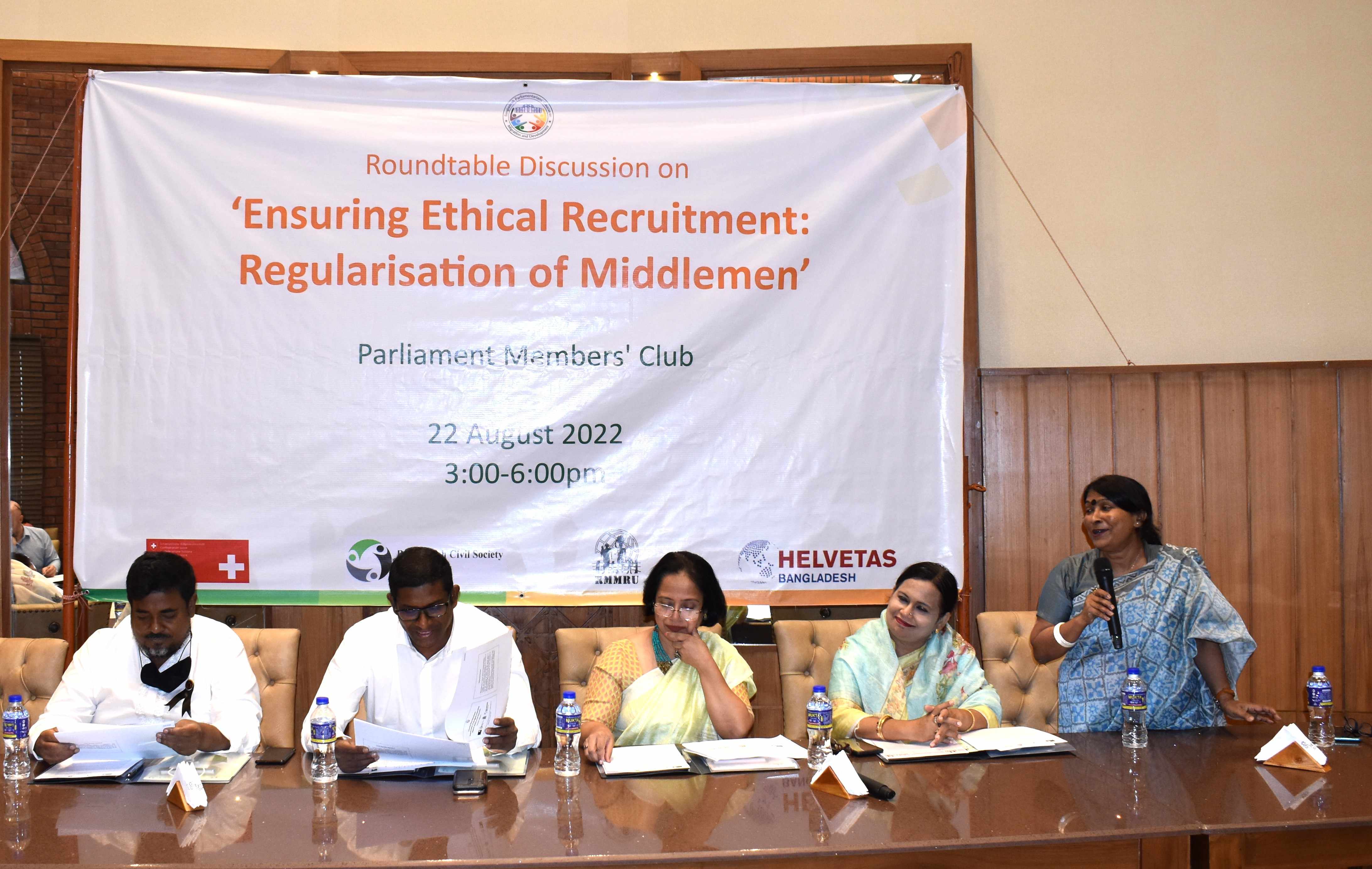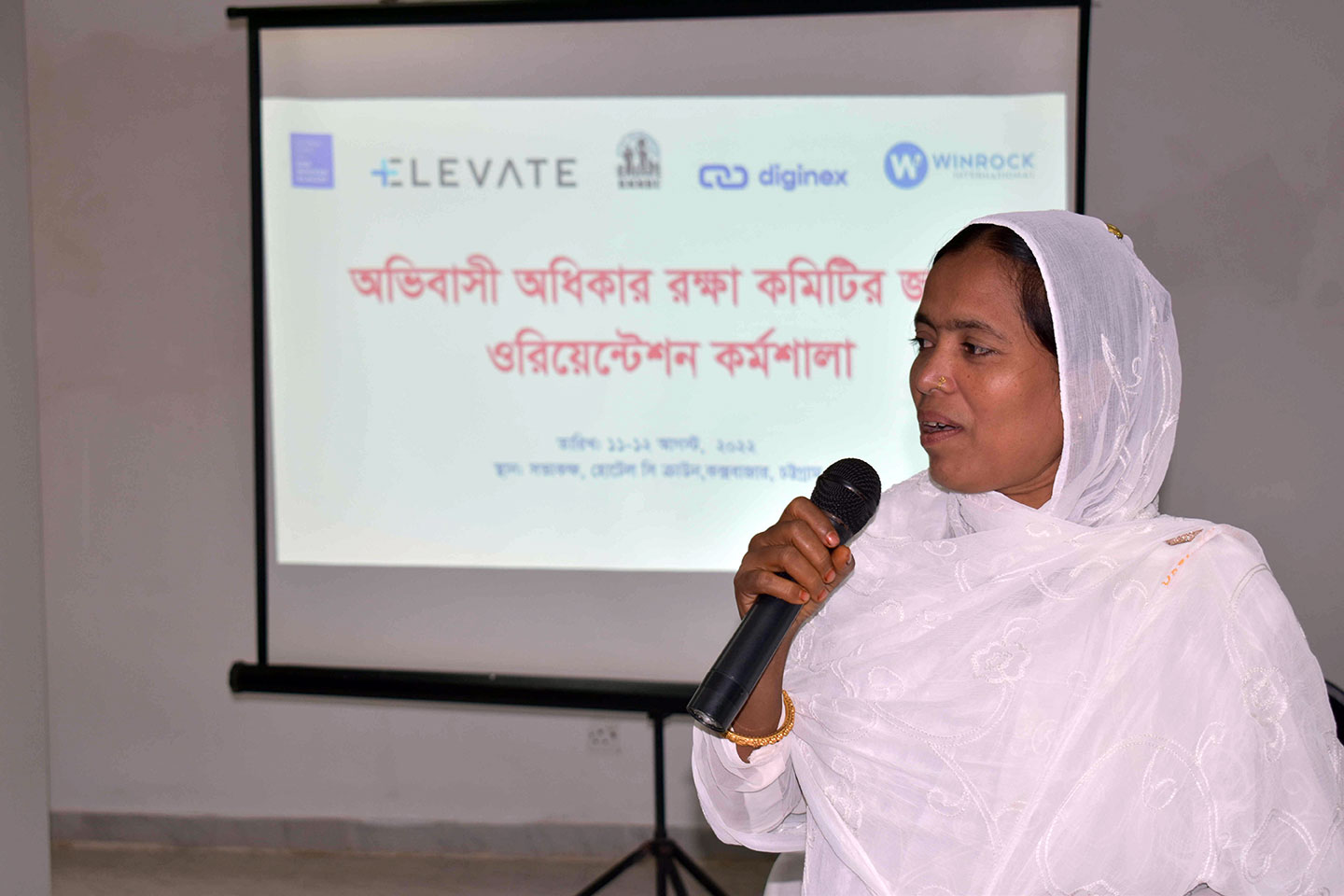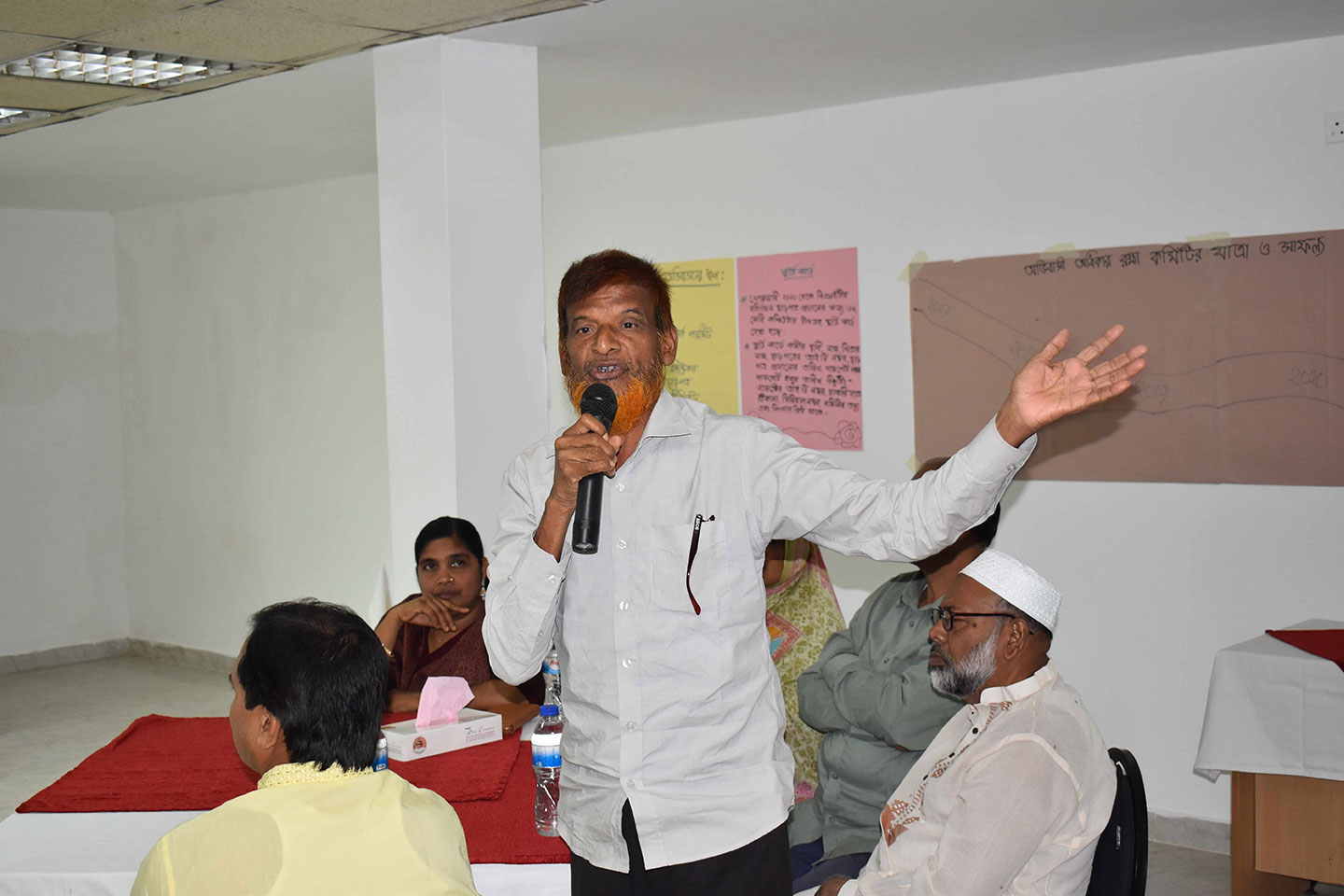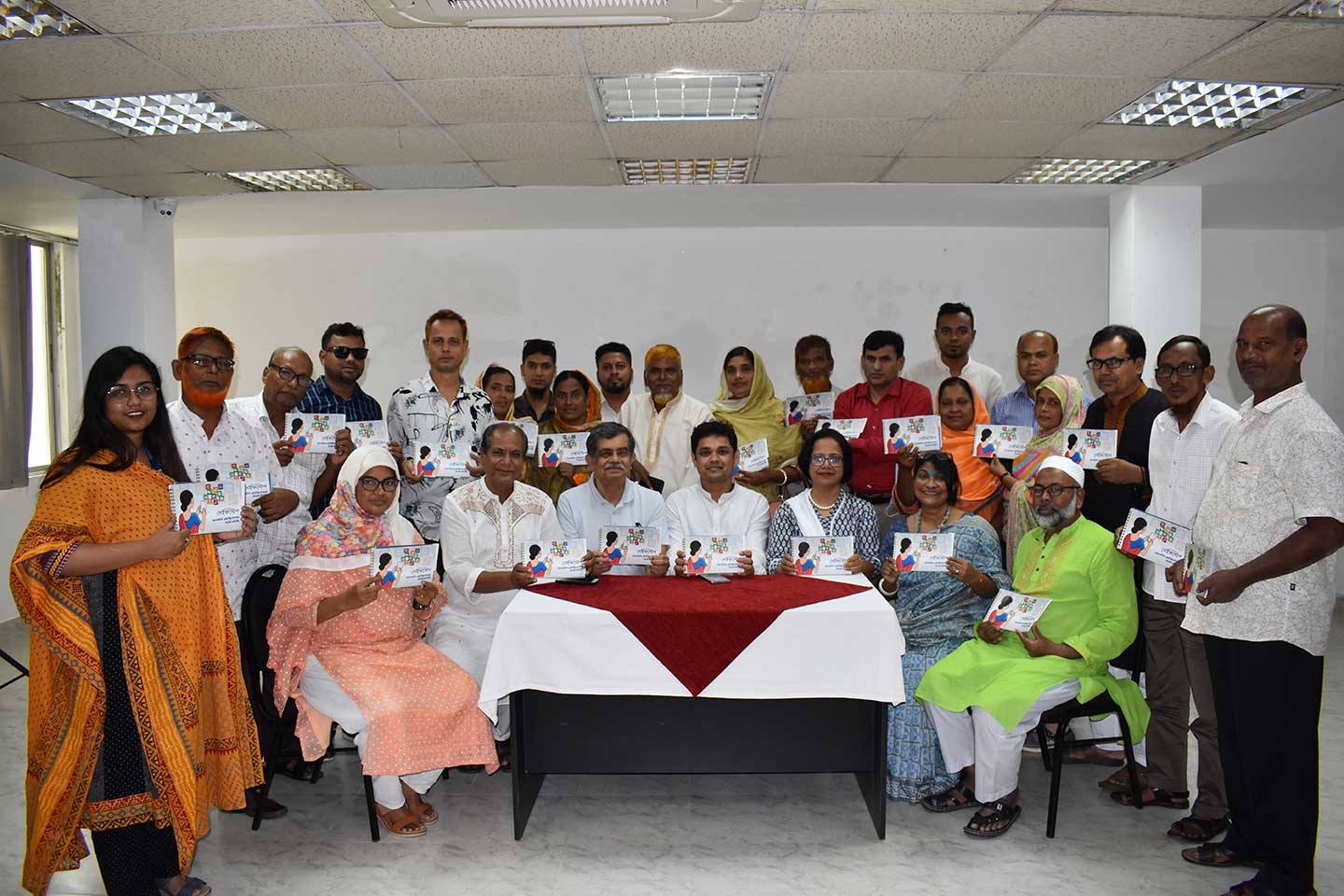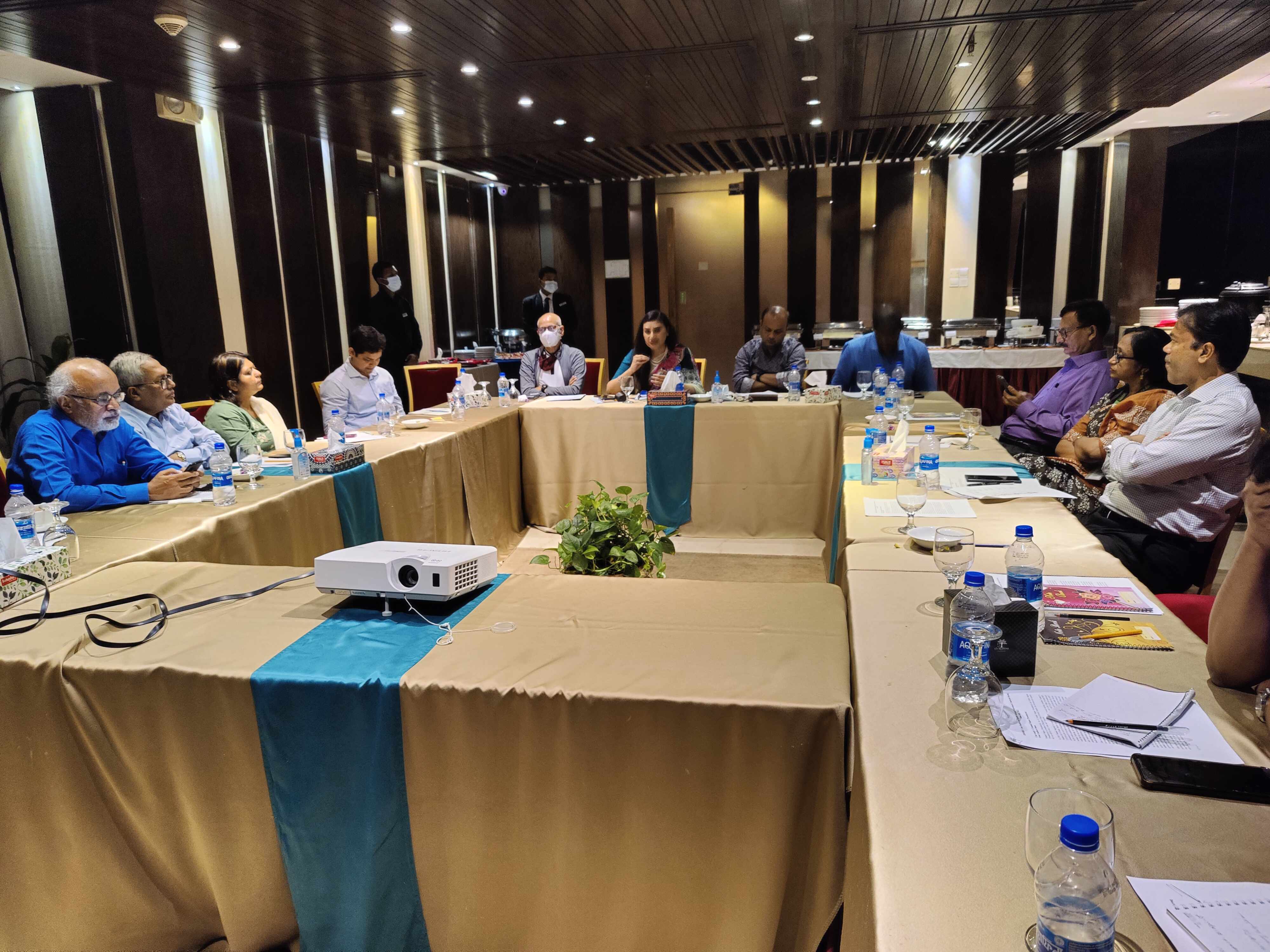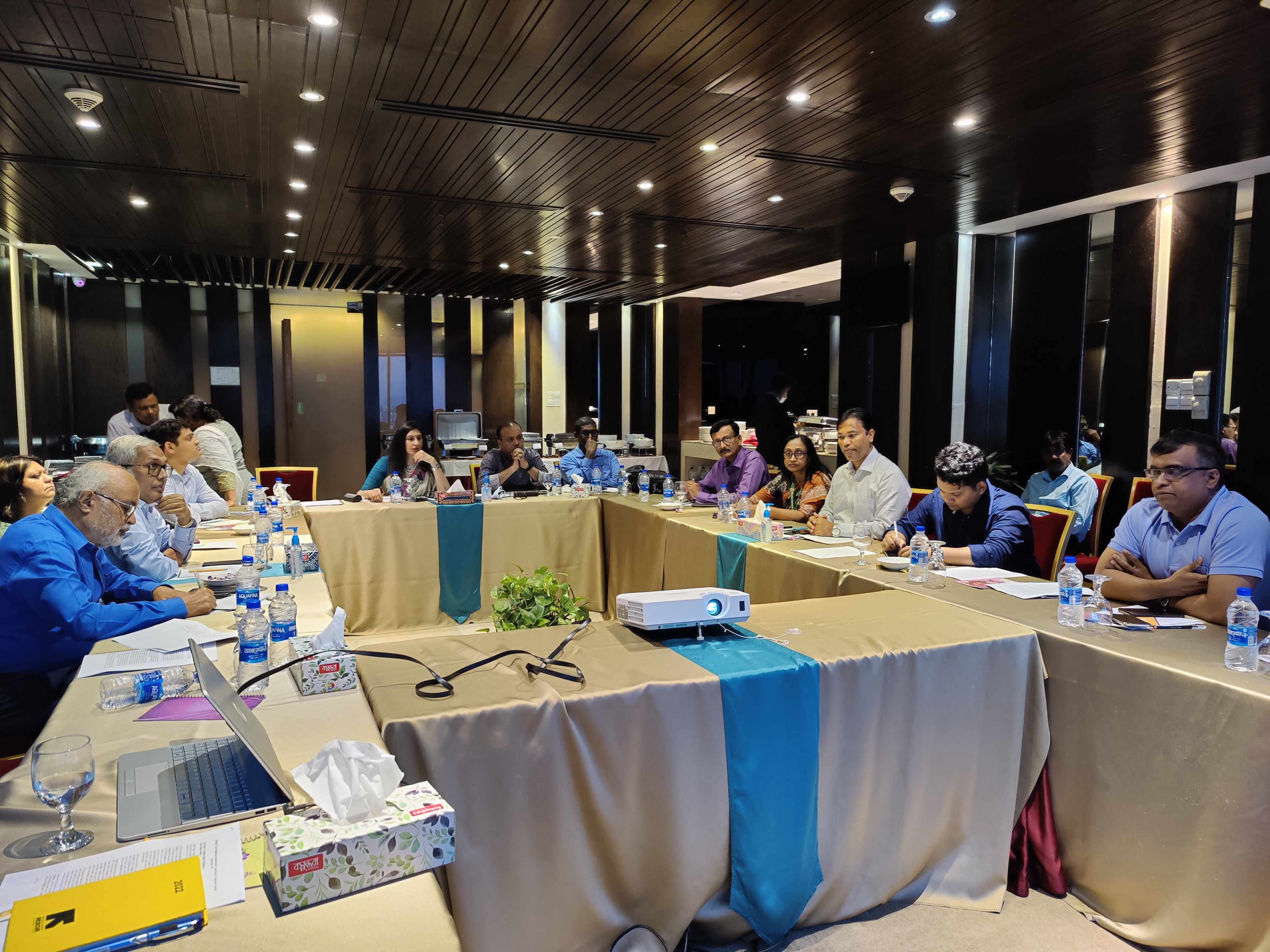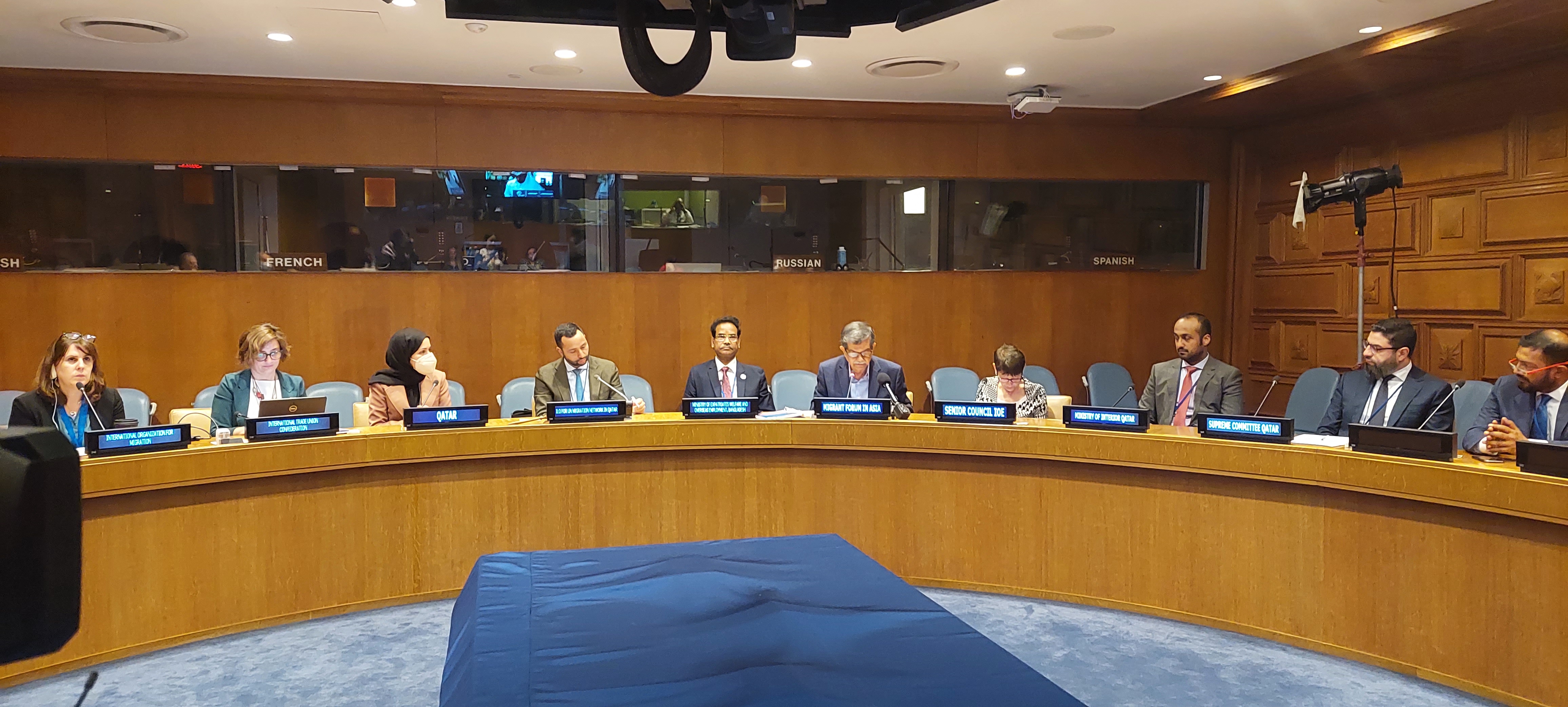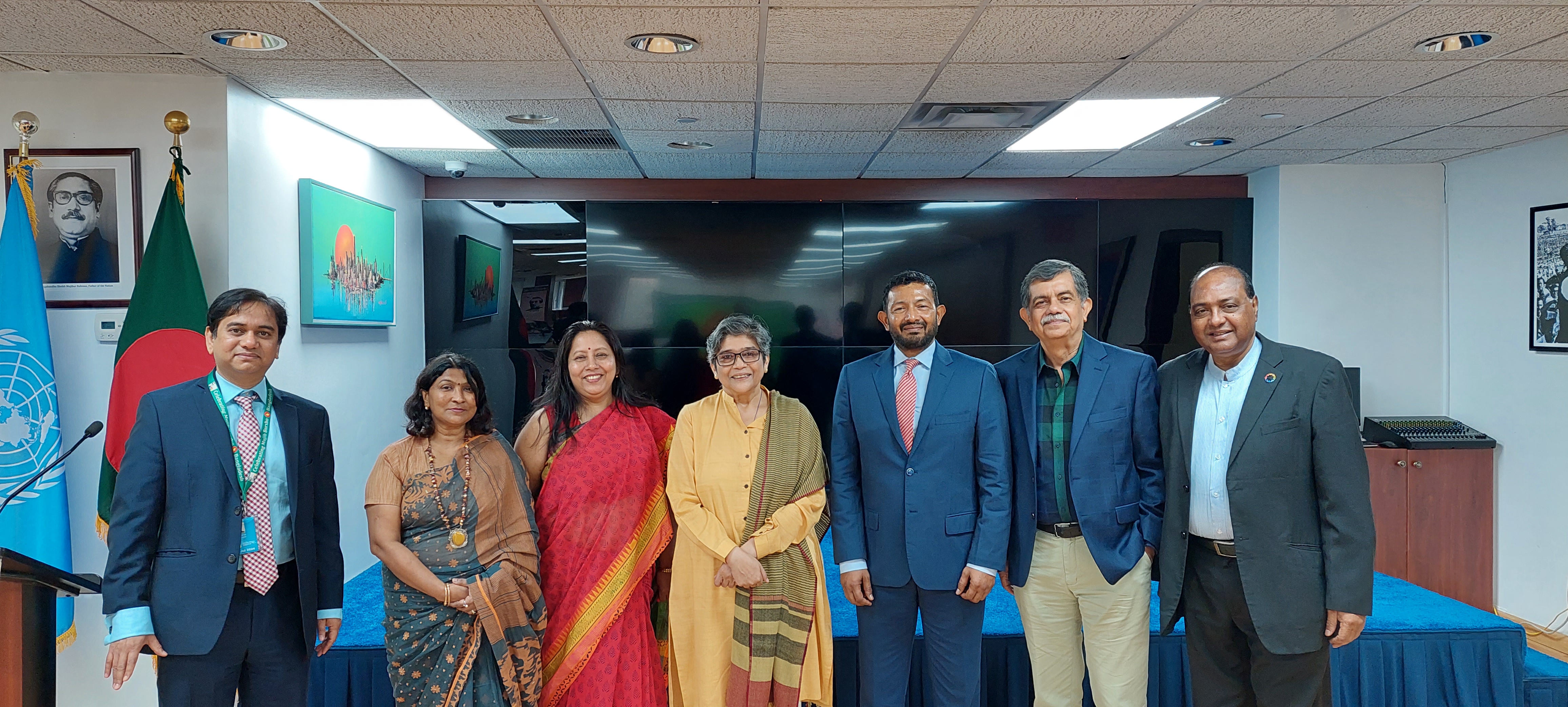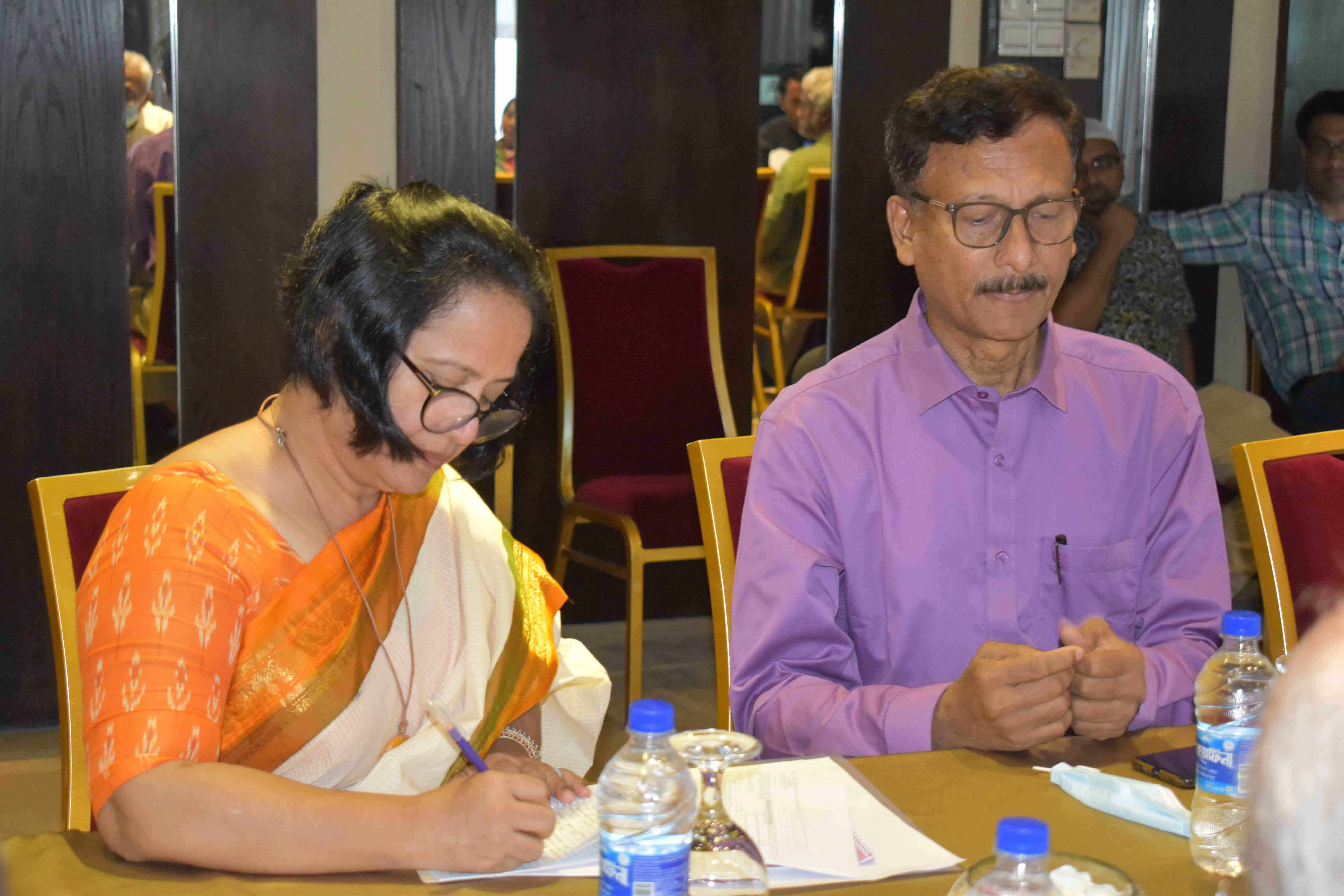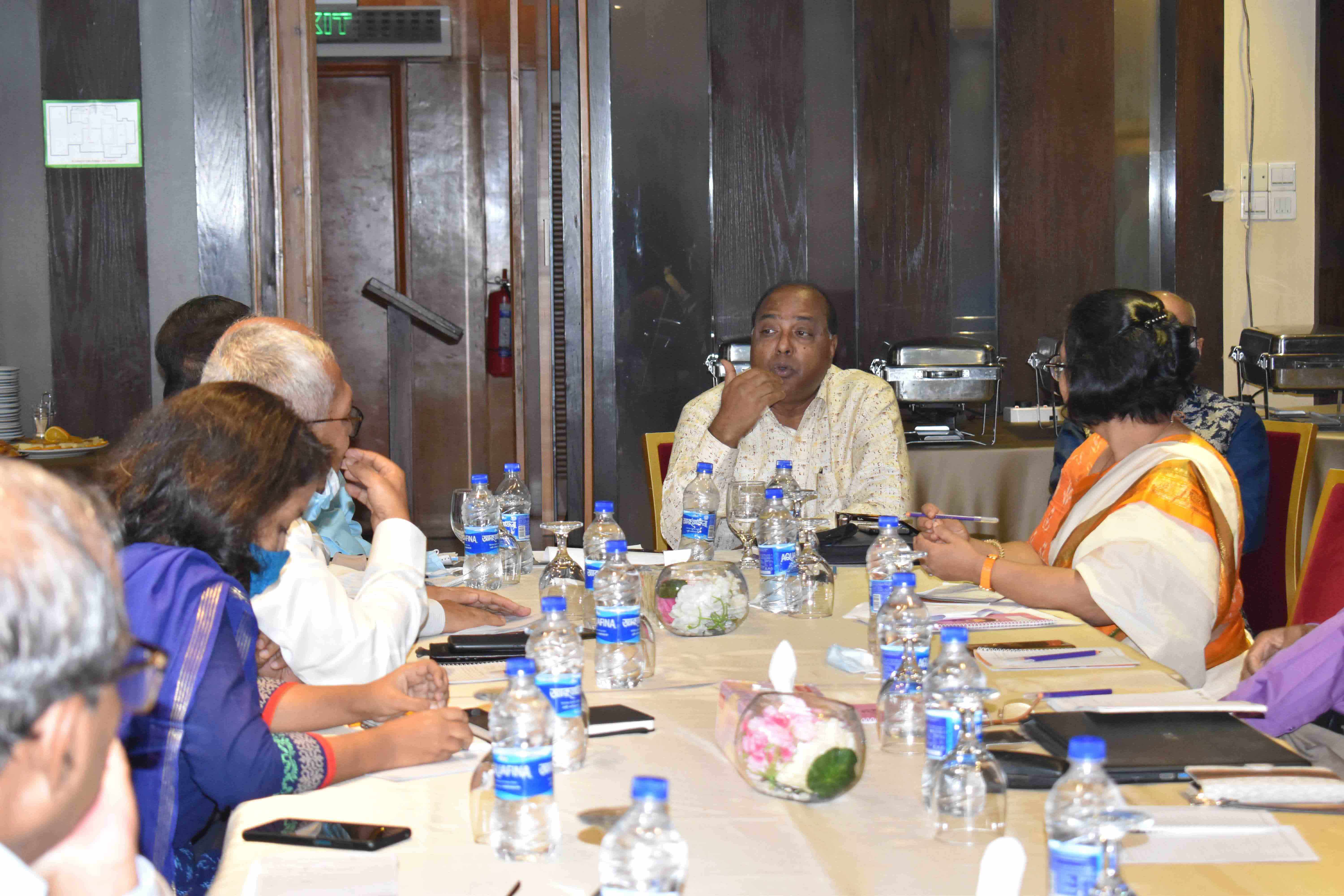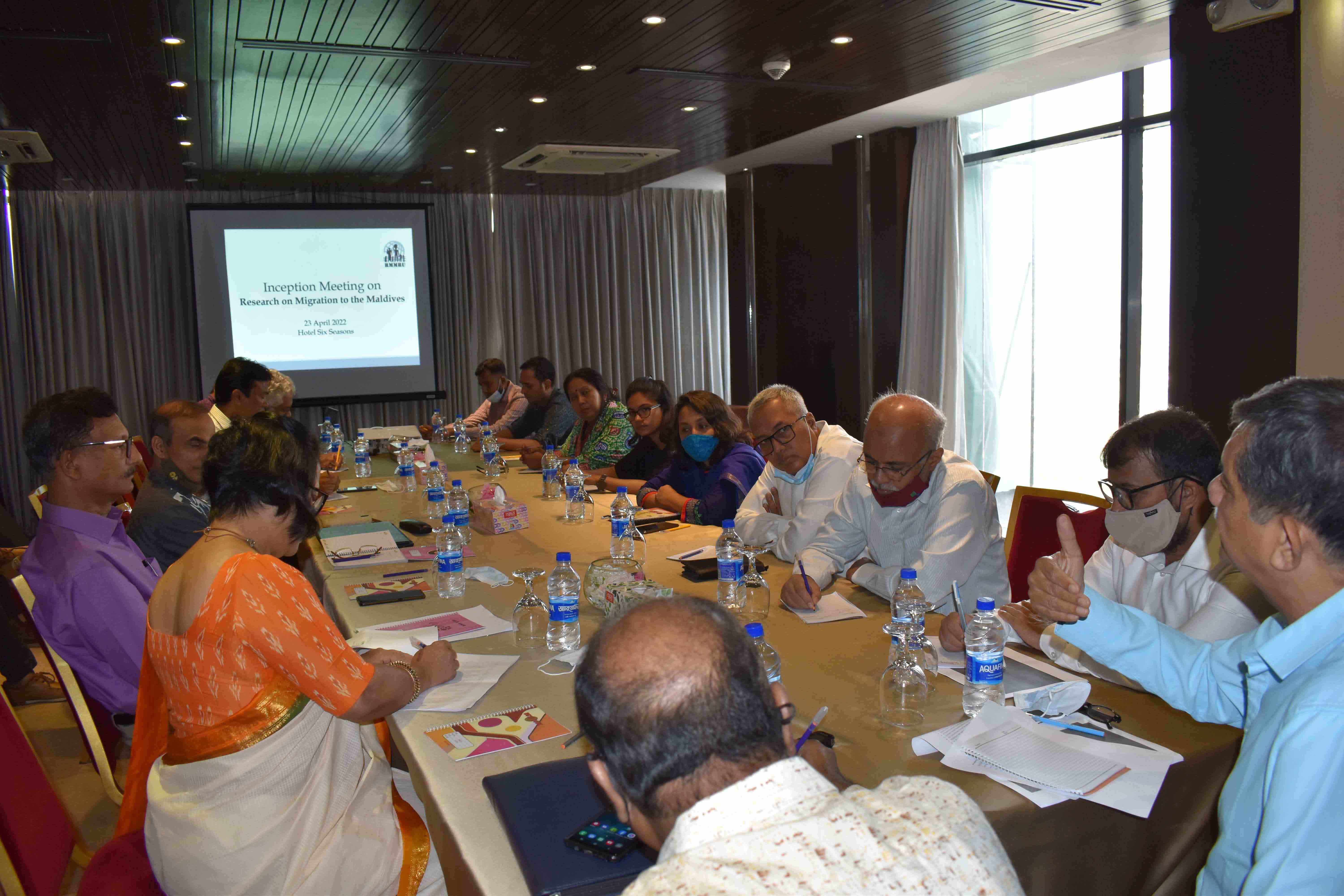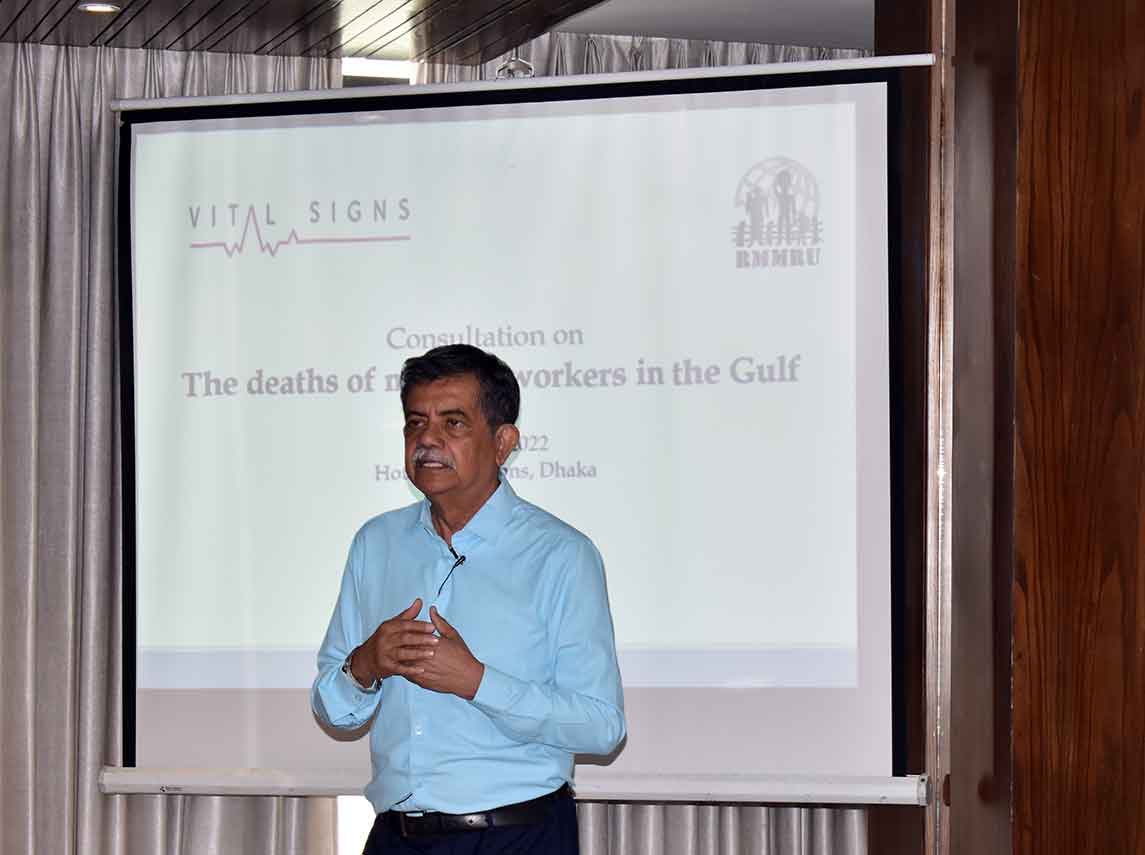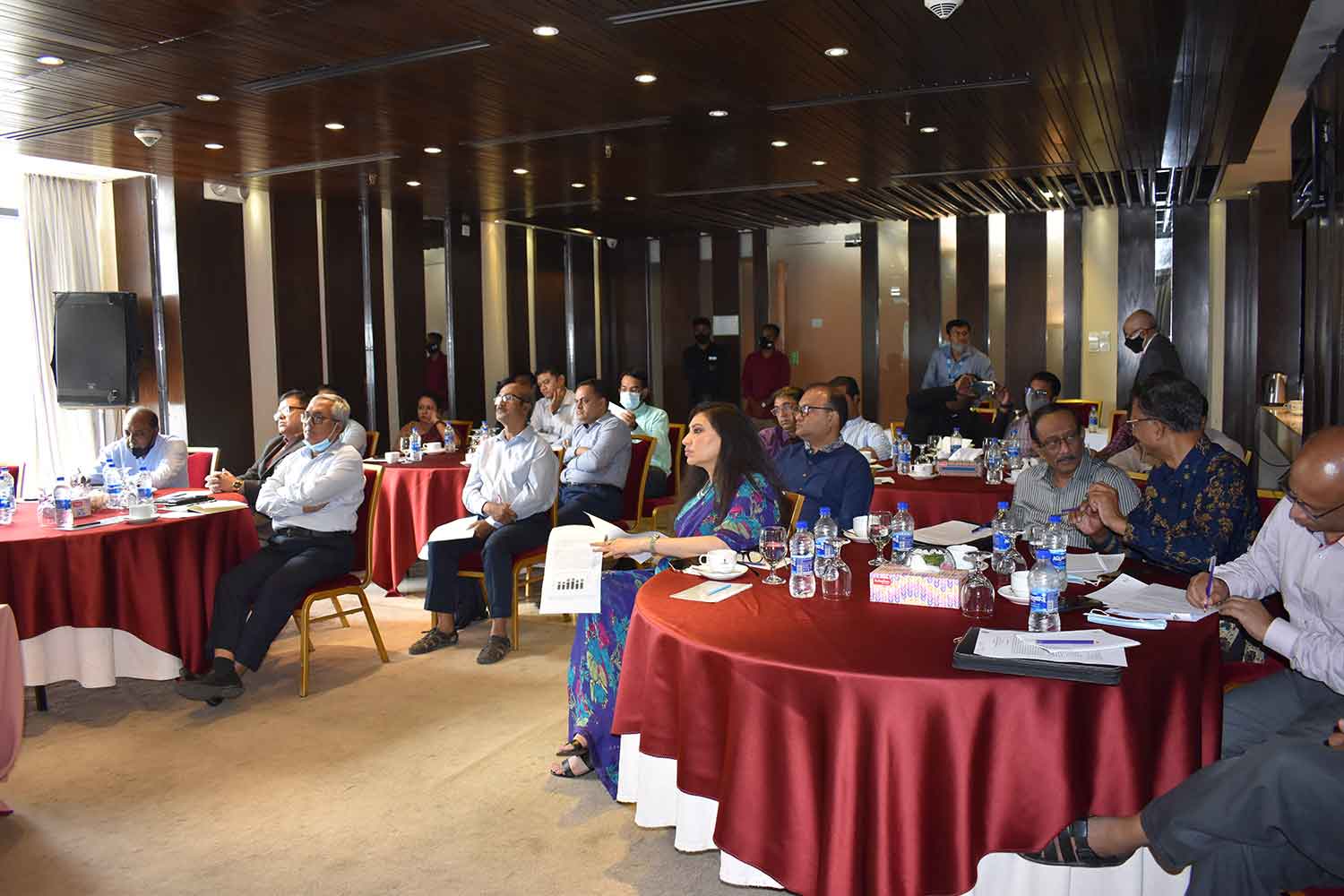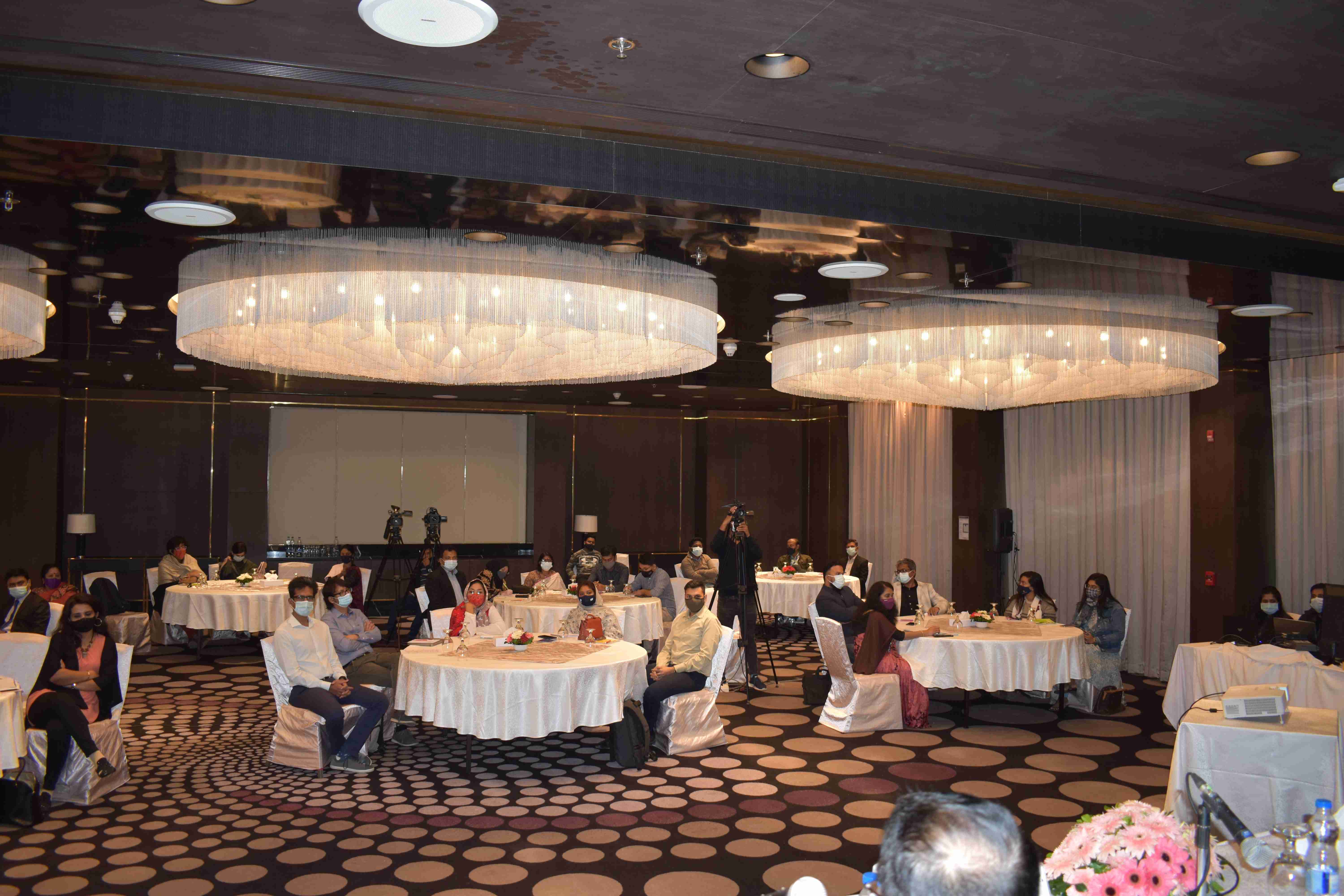Press Conference: The Patterns and Trends of Labour Migration from Bangladesh in 2022: Achievements and Challenges
Organized by: Refugee and Migratory Movements Research Unit (RMMRU)
Date: Thursday, 29 December 2022
Venue: VIP Lounge, National Press Club, Dhaka
Unveiling the report Dr. Tasneem Siddiqui said that, this year about 79 percent of migrant workers have gone abroad as ‘less skilled’ workers. Most people who collected visas through family connections migrated as ‘less-skilled’ workers. She added that the government needs to put more focus on developing the skill sets of workers and it is working to this end. If vocational training and certificates under those projects are sped up, it will be possible to send skilled and semi-skilled workers again. She also said that this year, Bangladesh saw a significant jump in overseas employment, it is likely that its positive impact will be seen in the remittance inflow next year. The report says the country’s overseas employment rose by 81.88 per cent this year. Bangladesh sent more than 1.0 million workers abroad in the months of this year. The employment will stand at more than 1.1 million at the end of the year. Migrant workers sent home US$19.58 billion in the January-November period of the current year. If the trend continues, the remittance income will stand at $21.36 billion at this year-end. But the migrant workers sent home $22.06 billion in 2021. The country’s inward remittance is expected to decline 3.17 per cent in the outgoing calendar year. Dr. Tasneem Siddiqui mentioned that the reason for declining remittance is worker’s dependency on ‘Hundi’ due to low rates in banks. She suggested ensuring safe migration and increasing incentives for the workers to encourage them to send money through official channels.
Nearly 75 journalists from different electronic and print media were present at the press conference and 26 electronic and print media covered the news. Please find the links to the coverage of the press conference below.
The Daily Prothom Alo: অভিবাসী কর্মী বেড়েছে, রেমিট্যান্সপ্রবাহ নেতিবাচক
The Daily Star: Labour migration to see 82pc increase
The Daily Bangladesh Protidin: বিদেশে জনশক্তি রপ্তানি বাড়লেও কমেছে রেমিট্যান্স পাঠানোর হার
The Daily Bangla Tribune: অভিবাসন বাড়লেও কমেছে রেমিট্যান্স : রামরু
The Dainik Bangla: জনশক্তি রপ্তানি বেড়েছে, রেমিটেন্স কমেছে: রামরু
The Daily Post: পাঁচ বছরে সৌদিতে আত্মহত্যা করেছেন ৫০ নারীকর্মী : রামরু
The Daily Dhaka Times: বেড়েছে জনশক্তি রপ্তানি, কমেছে রেমিটেন্স পাঠানোর পরিমাণ
The Daily Amader Somoy: জনশক্তি রপ্তানি বেশি হলেও কমেছে রেমিট্যান্স
The Daily Jugantor: জনশক্তি রপ্তানি বেশি হলেও কমেছে রেমিট্যান্সজনশক্তি রপ্তানি বাড়লেও কমেছে রেমিট্যান্স
The Banglanews24: পাঁচ বছরে বিদেশে মারা গেছেন ১৫,৩৬৮ বাংলাদেশি
Sarabangla.net: জনশক্তি রফতানি বেড়েছে, কমেছে রেমিট্যান্স
Sarabangla.net: জনশক্তি রফতানি বেড়েছে, কমেছে রেমিট্যান্সএবছর অভিবাসন বাড়লেও কমেছে রেমিট্যান্স: রামরু
The Daily Financial Express: Inward remittance to decline 3.17pc
UNB – United News of Bangladesh: 2022 may show 3.17% fall in remittance receipts: RMMRU
Asia News Network: Bangladesh labour migration to see 82 per cent increase /
The Daily Kaler Kantha: বাংলাদেশি অভিবাসী বাড়লেও কমছে রেমিট্যান্সের হার/
71 TV: পাঁচ বছরে বিদেশে মারা গেছেন ১৫ হাজার বাংলাদেশি/
The Daily Bonik Barta: ব্যাংকের ওপর অভিবাসীদের আস্থা ফেরানোর তাগিদ
R TV: নিরাপদ শ্রম অভিবাসনে রামরুর ৬ সুপারিশ
risingbd.com: পাঁচ বছরে বিদেশে মারা গেছেন ১৫৩৬৮ বাংলাদেশি কর্মী
Public Testimonies of Migrant Workers on Wage Theft
Date: 22nd December, 2022
Venue: VIP Lounge, National Press Club
The event was participated by 21 workers and member of workers’ families from three districts who were victims of wage theft in destination countries .Twelve returned migrants from Saudi Arabia, UAE and Lebanon d shared their experiences of wage theft at the event. They were cheated by the middlemen and recruiting agencies during going abroad. Bangladesh Press Council Chairman Justice Md Nizamul Huq Nasim, former advisor (Minister) to the caretaker government, Hossain Zillur Rahman and eminent rights activist Barrister Jyotirmoy Barua were present as panellists of this programme.
RMMRU Executive Director Dr C R Abrar moderated the programme and there he explained the wage theft concept, the role of MFA, RMMRU and BCSM on this issue. He informed that gradually the wage theft as a concept is being recognised with its mention in the GCM review document. He also recalled that Bangladesh Prime Minister also called for ensuring justice for the victims of wage theft. He also said that proper documentation of case of wage theft is required to create pressure on the destination countries.
After the introductory statement the migrants provided testimonies of their experiences of wage theft. One of the workers said, "The Saudi employer did not allow me to even sleep, let alone provide food. The employer forced me to work for 18 hours instead of eight hours as per contract. I was also tortured there. I did not get my due wages though I worked for months."
A female migrant said, "I lodged a complaint at BMET against Cumilla Overseas after I managed to return with much hardship. I was given only Tk 30,000 as compensation. The remaining money was not given untill now."
Omar Faruk, a resident from Keraniganj, spent Tk 500,000 Take for going to Lebanon. He returned home during the coronavirus outbreak after working for 11 years there. But a good segment of his wages and other entitlements were kept by the employers.
Eight more returnee migrants also narrated their own experiences of wage theft and lack of access to justice. They also narrated ill treatment and abuse that they endured in hands of the employers and agents.
After listening to the testimonies the Bangladesh Press Council Chairman Justice Md Nizamul Huq Nasim said, "It is a pity that despite being aware of the abuse towards migrant workers generally the state kept silent fearing to lose the labour market. We should overcome the fear and we must ensure workers' safety and interests first.’’
Former advisor to the caretaker government, Hossain Zillur Rahman, said a syndicate came into being in the name of visa trading and they are becoming powerful with political patronage. Migrants are going abroad through legal means, but they are turning irregular due to the syndicate in the destination country, he added. Lauding the civil society leadership in launching the Wage Theft campaign Rahman also said that a separate fund should be created to provide compensation to the victims of wage theft.
Rights activist Barrister Jyotirmoy Barua said the testimonies provided ample evidence that migrant workers' human rights were violated in various ways. "Every day, 8-10 bodies were received in Bangladesh but the cause of their deaths is still unknown and the governments won't even try to know it," he said. He said it is time we should exert pressure on both origin and destination states to create an atmosphere so that migrant workers can live and work in dignity.
Later a whole page supplement was published on 3rd January, 2023 at Daily Banik Barta.
News link:
The Daily Bonik Barta: মজুরি চুরির শিকার অভিবাসী শ্রমিকরা
The Business Standard: Activists, returnee migrants demand govt intervention to reclaim lost wages
The Daily Prothom Alo: সৌদি, দুবাই, লেবাননফেরত শ্রমিকেরা জানালেন ভয়াবহ অভিজ্ঞতা
The Daily Prothom Alo (Ebglish): Returnee migrants tell harrowing tales
The Daily Star: Stories of wage theft and injustice
The Daily New Age: Steps sought to reclaim stolen wages of migrant workers
The Daily Financial Express: High migration cost, fraud cause workers' woes
The Daily Bangla Tribune: মজুরি চুরি বন্ধ না হলে প্রবাসী শ্রমিকদের কল্যাণ সম্ভব নয়
Field Visit of High Officials of British High Commission
Project: ISEPR
Date: 12 December 2022, 8:30 am – 2.00 pm (Dhaka Time)
During the day-long field visit, The British High Commission Team firstly visited the field office of RMMRU, Tangail. A meeting with British High Commission team, officials of RMMRU and the members of advisory committee was conducted at field office of RMMRU, Tangail and a Power-Point presentation on the activities of the project, a video presentation on mediation and some publications of RMMRU was presented to the high officials of British High Commission. Then they attended a meeting with the members of Grievance Management Committee and Youth Volunteer group and local leaders and also attended a mediation at Paikora Union Parishad, Kalihati, Tangail.
Then they attended a court yard meeting and an opinion exchange meeting conducted by RMMRU and interacted with the returnee migrants and their family members. During the field visit, officials of British High Commission observed and understood the grassroots activities of the project and communicated with the potential entrepreneurs and learned about their business ideas.
Roundtable Discussion on Remittance Management: Toward Achieving Sustainable Economic Reintegration of Migrant Workers
Project: SIMS
Date: 08/12/2022, 1:30 pm – 5.00 pm (Dhaka Time)
On 8 December, 2022 RMMRU in collaboration with The Daily Samakal organised a roundtable discussion on ‘Remittance Management: Toward Achieving Sustainable Economic Reintegration of Migrant Workers’ to identify the key measures for ensuring stable remittance flow through legal channels under the SIMS project of Helvetas Bangladesh and supported by the Embassy of Switzerland. Prominent speakers of roundtable discussion emphasised on the investment scope, opportunities and interest in regard of developing migrants’ entrepreneurs within country.
Barrister Shameem Haider Patwary, MP & Chairperson, Bangladesh Parliamentarians’ Caucus on Migration and Development said, “we noticed that incentive has some impact on remittance sent by migrants. Remittance inflow increased in the year in which incentive was provided. If the facilities of migrants increase, remittance inflow will increase immediately”. He further added that another important factor is bank account. By opening a bank account of the migrants and a bank account of their beneficiaries, migrants can easily send money through the banking channel in a formal way.
Tanvir Shakil Joy, MP & Member, Bangladesh Parliamentarians’ Caucus on Migration and Development stated, “In Bangladesh, it is not very difficult to withdraw money through MFS like nagad, bkash or through a bank account. But the real problem is to send money from the destination countries. If there is a system of sending money to beneficiary through digital wallet of bank account and migrant worker can easily send money by using his smartphone, he will never send money through hundi market.”
Dr. Nashid Rizwana Monir, Deputy Secretary, Ministry of Expatriates' Welfare and Overseas Employment said, “this year, Ministry of Expatriates' Welfare and Overseas Employment has given maximum importance to remittance. Keeping the migrant workers in mind, financial accessibility has been placed as an important agenda in the current government’s eighth five-year plan. Remittance management is also included in this agenda. I think increasing incentives will bring positive change on remittance management.”
Dr. Ahsan H Monsur, Executive Director, Policy Research Institute said that, “as long as there is restriction on our capital market, it will be difficult to cope up with the hundi market. Not only the incentive, but also social safety-net can stop this hundi market.”
Emphasizing the importance of remittance, Dr. Tasneem Siddique, Chairperson, Department of Political Science, Dhaka University and Founding Chair of RMMRU said that “Migration sector and remittance sent by the migrants are sources of static power of our country. Banks and other related institutions should be proactive in ensuring that migrants can use trusted banks to send remittance.”
Important stakeholders including honorable members of Parliamentary Caucus on Migration and Development and MoEWOE were present in the programme and shared their opinion on the discussion.
The Daily Samakal: সহজ ব্যবস্থায় বাড়বে রেমিট্যান্স
The Daily Samakal: রেমিট্যান্স বাড়াতে প্রয়োজন সহজ ব্যাংকিং সেবা
YouTube: ব্যাংকিং খাতে অস্থিরতা; সঠিক চ্যানেলে আসছে না প্রবাসী আয়
Stakeholders’ Engagement meeting at BMET
Date: 7th December, 2022
Venue: Conference Room, Training Section, BMET
RMMRU and the Vital Signs partnership is supported by the UK based organisation, Fair Square which is researching the causes of unnatural deaths of South Asian migrant workers in the Gulf destination countries and their access to health care issues. The report was the second in a series of three. It was published as part of the study.
Roundtable Conference on Access to Justice for Migrant Workers: National and International Perspectives
Date: 11th November, 2022
Venue: Conference Room, Daily Samakal
Guests:
Chairman of the National Press Council and former justice of the Appellate Division of the Supreme Court of Bangladesh Mr. Nizamul Haque Nasim, Chair of the Parliamentarians Caucus on Migration and Development Barrister Shamim Haider Patwari MP, former Foreign Secretary Touhid Hossain, former Joint Secretary of the Ministry of Expatriates KaziA bul Kamal, Professor of Department of Law of Dhaka University Dr. Mahbubur Rahman, Barrister Jyotirmoy Barua, Advocate Tajul Islam, Head of BRAC Migration Shariful Hasan and The Daily Samakal's Advisory Editor Abu Sayeed Khan shared their thoughts on the migrants’ access to justice.
Discussion:
Justice Nizamul Haque Nasim recalling his personal experience during his visit to Malaysia in the mid 1980s said though hundred of migrant s came to Bangladesh embassy to take services every day, the embassy did not cooperate with them. “The officials did not perform their duties properly.” He said over the years he had heard narratives of wage theft endured by the migrant workers. “It is a pity that so far we have not been able to provide them with redress for their claims of lost wages. The government must set up proper mechanism both in the country of destination and origin to ensure that labour migrants are able to bear the fruits of their labour”, he said.
Barrister Shamim Haider Patwary said “Due to lack of adequate staff at the missions in the countries of destination and lack of inter-ministerial coordination, the suffering of migrant workers cannot be mitigated. In order to ensure justice for expatriates, the Ministry of Expatriate Welfare and Foreign Employment should take over the task of coordination. Interference of other ministries should be stopped. A separate judicial arrangement has to be set up to address the lack of access to justice.’’
Samakal’s Abu Sayeed Khan said, “As we celebrate fifty years of independence it is time for us to ensure that all citizens are able to enjoy life with dignity. One of the prime pillars of that is to access justice. However, we know from newspaper reports that over the decades migrant workers are denied from enjoying access to justice. It is time for the state to ensure to put in place mechanism so that migrant workers are not subjected to wage theft. One of the first tasks in this regard is to systematically collect data on cases and magnitude of wage theft. The government can secure services of the civil society organisations such as that of RMMRU in collecting such data.
Dr. CR Abrar of RMMRU observed “There are many achievements in rendering services to migrant workers. There are laws, rules, regulations and specialised institutions for them but they are yet to enjoy dignity and rights. In many instance migrant workers are not even aware of their rights. For this, they fall prey to fraud and torture after going abroad. Again, there is a palpable gap in the services rendered by the embassy officials in upholding the rights of our migrnat workers. We need a concerted effort to address the problem of access to justice by migrant workers.”
Former government official Kazi Abul Kamal opined, “About 77 percent of workers of the country are going abroad with the help of friends and family members. In the process of movement, most of them are harassed by sub agents. Again, even if they suffer abroad, they have to take legal assistance with their own money. Institutional support from the embassy is critical to ensure that migrant workers are subjected to wage theft.”
Former foreign secretary Touhid Hossain said “It costs a workers from India or Nepal costs Tk 72, 000 to secure work in Malaysia. On the contrary, this figure for Bangladeshi workers is two and a half lakh taka. Obviously something is grossly wrong in our system. Even if they are paid regularly at the wages agreed upon Bangladeshi migrant workers have to work 8 to 10 months only to pay for the cost of migration. So, I would say they are subjected to wage theft even before they migrate. Migrant workers are not getting justice due to corruption in this sector. We must not gloss over the problems at our end”.
Professor Mahbubur Rahman opined, “Efforts much be be made so that migrant worker are made aware of the rights. The recruiting agencies should be held accountable to ensure that migrant workers are not subjected to rights violation, ill treatment and wage theft. Arrangements should be made to appoint legal aid officers in Bangladesh embassies abroad.”
Brac’s Shariful Hasan said “Workers come under harassment in various ways before leaving country. After going abroad, some of them have to work 18-20 hours a day; more than 20 people live in one room, creating health hazard. About 45,000 migrant workers have died in the last 15 years, an average of 10 a day. Most of these deaths in 20 to 30-year-olds are due to stroke and heart disease but there is no investigation into these incidents,”
Other speakers also heighted the problems that migrant workers face at the grassroots.nLater a whole page supplement was published on 26th December, 2022 at Daily Samakal.
News Link:
The Daily Samakal (Bangla): অভিবাসীকর্মীর সুবিচার প্রাপ্তি নিশ্চিত করতে হবে
The Daily Samakal (English): Embassies need to be more responsible in protecting expatriates’ rights: Speakers
Channel 24: Embassies need to be more responsible in protecting expatriates’ rights: Speakers
Capacity Building Training of GMC member on Mediation
Organised by Refugee and Migratory Movements Research Unit (RMMRU)
Supported by ISEPR project of British High Commission
Date: 9th November 2022
Place: Tangail
Objective of the training are
● Enhancing the skill and Promoting the capacity and credibility of GMCs on migration mediation
● Enhance knowledge of GMC members about access to justice mechanism, Migration Act -2013, Rules to ensure justice for affected migrant communities locally
● Improving documentation of the mediation process following every stages of mediation with proper guidance, rules and regulations
Advocate Humayun Ahmed, Panel Lawyer of RMMRU as well as advisory committee member of GMCs facilitated this capacity building training for GMC members on Migration Mediation, Overseas Employment and Migration Act-2013 and ADR. Ms. Rabeya Nasrin, Project Manager and Ms. Nazma Akhter, Field Coordinator, Mr. Ayub Ali, Field Manager of RMMRU also conducted the sessions on RMMRU’s migration mediation, steps of mediation, documentation of mediation etc. accordingly. This capacity building training highlighted the issues like mediation, importance and necessity of mediation for migration grievances, challenges as well as mitigation strategy through GMCs as group work presentation, role play, experience sharing etc. GMC members and youth volunteer groups become more confident about mediation and providing services locally.
Vital Signs 2nd Report Launching Event on Migrants’ Access to Healthcare in the Gulf
Date: 5th November, 2022
Venue: Zahur Hossain Hall, National Press Club
● Easy access to healthcare is particularly critical for low-paid, migrant workers in the Gulf due to the multiple adverse health conditions that can result from their work. The GCC states’ healthcare services are generally not tailored to the specific needs of this population, and there is obvious evidence of discrimination in access to healthcare for migrant workers, with lack of documentation and affordability the most significant obstacles.
● The inability of low-paid migrant workers to easily access non-emergency healthcare services has a detrimental effect on the general physical and mental health of this population, and it is likely that it is a significant factor both in the number of preventable deaths, and the high rate of unexplained deaths.
● The gradual shift in the region to mandatory private health insurance is more likely to further restrict access to care than to improve low-paid migrant workers’ access to healthcare.
Two returnee migrants Nasima Akter (Saudi Abaria) and Tazul Islam (Oman) shared their negative experiences for accessing the heath care in the Gulf States. Several renowned print and electronic media joined the programme and covered several news.
The event was conducted by Dr. C R Abrar, Executive Director, RMMRU. The chief guest was Doctor Rashdi Mahboob, Former president Bangladesh Medical Association. Besides Sayed Saiful Haque, Chairman, WARBE Development Foundation, Sumaiya Islam, Executive Director, BNSK, Doctor Faiezul Hakim Secretary, National Liberal Council and Md. Nur Khan, Executive Director, Ayeen O Shalish Kendra had joined the programme and shared valuable knowledges regarding the health issues of migrants.
News Link:
The Daily Star: Ensure their easy access to health care in the Gulf
The Daily New Age: 80pc migrant workers denied health services in Kuwait: study
The Daily Prothom Alo: মধ্যপ্রাচ্যে সহজে চিকিৎসা পান না নিম্ন আয়ের প্রবাসীরা
The Financial Express: Low-paid workers face lack of access to care: Report
The Business Post: One-third of migrants in gulf have no access to healthcare
DBC NEWS: রেমিটেন্সের পাশাপাশি অভিবাসীদের স্বাস্থ্যসেবা নিশ্চিতের তাগিদ
Independent Television: সৌদি আরব, কাতারসহ সাতটি দেশে স্বাস্থ্যঝুঁ কিতে প্রবাসী শ্রমিকরা
TAF-RMMRU Study on migration to Maldives
Training Workshop for Promoting Mediation at the Grassroots Level
Date: 2nd November, 2022
Returnee migrants have some recurring complains of being cheated by sub-agents through false employment hopes and high recruitment costs and tortured in the country of destinations. Most of these migrants cannot afford to pay such high costs. Many of them do not succeed by spending. Most of the aggrieved migrant workers do not have any idea of settling the disputes.
The aim of the workshop was to inform the migrants of such cases and ways to prevent them. The first session consisted of a presentation of what is mediation followed an interactive session where the migrants shared their stories at home and abroad. In the second session, trainer had not only promoted mediation to the migrants but also informed them of the ways in which they can proceed with their migration process through the proper channels. The goal was to ensure that migrants use the formal ways to migrate to prevent them from being cheated by sub-agents in the future. We also hoped that the trainees would then share the knowledge they gained from the workshop to other migrants in order to further spread the work.
TAF-RMMRU Study on migration to Maldives
Training Workshop for Promoting Mediation at the Grassroots Level
Date- 14th September, 2022
Returnee migrants have one recurring complaint of being cheated by sub-agent through false employment hopes and high recruitment costs. Most of these migrants cannot afford to pay such high recruitment non-existent costs. However, in order to migrate many of them take up loans to pay for such costs which end up being a big burden on them.
The aim of the workshop was to inform the migrants of such cases and ways to prevent them. The first session consisted of an informal presentation of what is mediation followed an interactive session where the migrants shared their stories at home. These also included stories of their experiences of their tenure abroad. In the second session our trainer had not only promoted mediation to the migrants but also informed them of the ways in which they can proceed with their migration process through formal channels. The goal was to ensure that migrants use the formal ways to migrate to prevent them from being cheated by sub-agents in the future. We also hoped that the trainees would then share the knowledge they gained from the workshop to other migrants in order to further spread the work.
The workshop ended with lunch provided by RMMRU to all participants.
Roundtable Discussion: Ensuring Ethical Recruitment: Regularisation of Middlemen
Organised by: RMMRU in collaboration with the Parliamentarian Caucus on Migration and Development and Bangladesh Civil Society for Migrants (BCSM)
Date: 22 August 2022
Time: 3:00pm-6:00pm
Venue: Parliament Members’ Club, Jatiya Sangsad Bhaban, Agargaon
RMMRU in collaboration with the Parliamentarian Caucus on Migration and Development and Bangladesh Civil Society for Migrants (BCSM), organised a Roundtable Discussion on ‘Ensuring Ethical Recruitment: Regularisation of Middlemen on 22 August.2022 under the SIMS project of Helvetas supported by the Embassy of Switzerland. The programme was held at the Parliament Members’ Club in Jatiya Sangsad. The objective of the event w`as to accelerate the process of regularisation of the middlemen ahead of the TAWG of the Colombo Process and to ensure the corresponding legal framework. Prominent speakers highlighted the issue of addressing the needs to regularise sub-agents or middlemen in the labour migration sector in line with the relevant law to address fraudulence and ensure ethical recruitment practices. They also emphasised on the issue that middlemen need recognition as they play a vital role in sending workers abroad.Dr. Tasneem Siddiqui, Chairperson, Department of Political Science, Dhaka University and Founding Chair of RMMRU in her keynote presentation, shared three separate models of regularising sub-agents and placed those before the stakeholders. Referring to RMMRU’s previous study, Dr. Siddiqui mentioned that the sub-agents provide 17 different services to migrant workers. She stated that recruiting agencies also take the services of sub-agents but they "procure" that informally.
Barrister Shameem Haider Patwary, MP and Chairman of Parliamentary Caucus on Migration and Development chaired and moderated the event. Addressing the need for regularising sub-agents, he said “irregularities and false commitments while sending workers will decrease if the middlemen are brought under a regulation”. He further added that if the regularisation process of sub-agents were done earlier then the migration sector would be benefitted more and monitoring of sub-agents could help combating exploitation of migrant workers abroad.
Emphasising the importance of regularisation of sub-agents, Tanvir Shakil Joy, MP, stated that “the models shared at today’s roundtable can be scrutinised and the best among them maybe chosen for regularisation. The recruiting agencies may be held accountable as well in this case and this is to be monitored by BMET and the Ministry of Expatriates’ Welfare and Overseas Employment”.
Md. Sanowar Hossain, MP said, “The middlemen are working at the grass root level, but they don’t have the formal recognition”. He further emphasised that the sub-agents need to be treated with respect by the recruiting agencies and everyone involved. Because if they ever go on strike at the field level, the recruiting agency will not be able to send as many people they are sending abroad now. He said “regularisation is the urgent need at the moment. Honorable MP further added that a large number of workers migrate every year, however it needs to be identified that among those sent how many workers are actually skilled.
One of the sub-agents from Tangail who attended the programme urged that sub-agents should be enlisted by agencies and an identity card can also be issued. Another from Cumilla said, “My daughter asks me what is your profession? But I cannot tell her as people in my locality call me dalal. Whenever someone sent by me spends good time after going abroad people say God has blessed him but whenever someone is faced by tough times, the same people say it is my fault. So in my locality how can I be free of the title dalal and have a socially respectable identity please you decide.”
Shakirul Islam, Chairperson, OKUP said, “whenever it comes to celebration of sending large number of migrants abroad the first ones to join are the recruiting agencies. So if they can take credit for the good things then why they cannot be held liable as well when someone is deceived.”
Important stakeholders including honorable members of parliament and Parliamentarians' Caucus on Migration and Development were present during the programme and shared their views on the significance of regularisation of sub-agents. Md. Shahidul Alam, NDC, Director General, Bureau of Manpower Employment and Training was present as the special guest of the roundtable. Among others Nazia Haider from the Embassy of Switzerland in Bangladesh, Mr. Premangshu Shekhar Sarker, Helvetas Bangladesh, Syed Saiful Haque, Chairman, WARBE DF and Co-Chair BCSM, Akib Anwar, Winrock Int also took part in the programme and shared their opinions on the discussion.
The Daily New Age: Call to bring sub-agents under regulation
The Business Standard: Regularising middlemen will deter malpractices in manpower export: Stakeholders
The Daily Star: ‘Regularise, recognise sub-agents’
The Daily Prothom Alo: বিদেশ যাওয়ার লোকগোছানো ‘দালালদের’ স্বীকৃতি দেওয়ার দাবি
The Business Insider: বিদেশ যাওয়ার লোকগোছানো ‘দালালদের’ স্বীকৃতি দেওয়ার দাবি
A Model for Ensuring Ethical Recruitment at the Grassroots Regularisation of Sub-Agents in Bangladesh Click here to read
Refresher Training for MRPC Members
Organised by Refugee and Migratory Movements Research Unit (RMMRU)
Date: 11 and 12 August 2022
Venue: Conference Room, Hotel Sea Crown, Cox’s Bazar
Consultation Workshop “Obhibashon Alochona” on Access to Healthcare
Project Name: Vital Signs
Date: 3rd August, 2022
Access to health care and workplace safety at destination countries are critical yet under-focused issue in the countries of origin including Bangladesh. Bangladesh, as a major origin country needs to engage more in research and international policy advocacy to ensure that its migrant work force has improved access to health care and decent working conditions at the destination countries. It is with this aim RMMRU, along with four other organizations from India, Pakistan, Nepal, and the Philippines, are participating in a variety of activities to collectively advance the agenda at the national, regional, and global levels on migrant health issues.
Important stakeholder participated in the meeting including Mr. Barrister Shameem Haider Patwary, MP, Mr. Tanvir Shakil Joy, MP, Ms. Mahjabeen Khaled Secretary General Bangladesh Parliamentarians' Caucus on Migration and Development, Mr. Md. Touhid Hossain, Former Secretary, Migration Expert Dr. Nurul Islam, Joint Secretary Kazi Abul kalam, Mr. Shameem Ahmed Chowdhury Noman, Former Secretary General, BAIRA, Mohammed Fakhrul Islam, Ex-Finance Secretary, BAIRA Managing Partner, Psychiatrist Dr. Rehana Begum, Akib Anwar, Winrock Int., Udisa Islam, Bangla Tribune, Owasim Uddin, Freelance Jounalist Marina Sultana, Director (Programme) RMMRU, Anisur Rahman Khan, IMA Reseach Foundation . They shared their thoughts and insights in the discussion.
Participation at the International Migration Review Forum
Date: 17-20 May, 2022
Venue: United Nations Headquarters, New York
The first International Migration Review Forum was held on 17-20 May, 2022 at the United Nations Headquarters in New York. The Member States reviewed the progress made at the local, national, regional and global levels in implementing the Global Compact for Safe, Orderly and Regular Migration (GCM) in the framework of the United Nations through a State-led approach and with the participation of all relevant stakeholders. This resulted in formation of an intergovernmentally agreed Progress Declaration.
A parallel event of global civil society titled People’s Migration Challenge was held from 14 to 20 May at nearby premises. This event was organised by Migrant Forum in Asia in collaboration with several regional and international networks.
Dr. C R Abrar, Executive Director of RMMRU attended as a Representative of Migrant Forum in Asia at the side event, “Fair Recruitment and Decent Work in the Bangladesh-Qatar Corridor: Lessons for International Cooperation” which is organised by Government of Qatar in collaboration with the Government of Bangladesh. Ms. Marina Sultana, Director of Programme of RMMRU also participated in the Forum.
The outcome of the International Migration Review Forum: Click here to download
The Inception meeting of the research on migration to the Maldives
Organised by Refugee and Migratory Movements Research Unit (RMMRU)
Date: 23 April 2022
Venue: Hotel Six Seasons, Dhaka
The researchers presented a short presentation at the meeting on the overall migration dynamics to the Maldives, as well as the opportunities and challenges for migrants. Surprisingly, there are approximately 150,000 Bangladeshi workers in the Maldives. It is estimated that over 50,000 of them are undocumented. The cause is informal migration. The Maldives was also dubbed a "dumping ground" for aspiring Bangladeshi migrants. When recruiting agents allegedly fail to find overseas jobs for their clients, they send them there.
The researchers also emphasized the significance of the Maldives as a destination for current and prospective migrant workers. Their literature review revealed several issues concerning gender perspectives. Following the brief presentation, the floor was opened to stakeholders and migration experts. At the RMMRU meeting, stakeholders including former diplomats, recruiters, and rights activists observed that because Bangladeshi workers account for one-fifth of the Maldivian population, a significant portion of the local population is hostile to them. Bangladeshi workers are stigmatized in some other countries as well. The panelists contended that such hostility was never raised with the host nations. Many of the workers arrive at their destinations with seemingly valid documents but no work permits. This type of situation raises the question of monitoring and governance at Bangladeshi exit points. According to the stakeholder, Bangladeshi missions must improve their economic diplomacy in order to maximize national interests in remittances and trade globally.
National Consultation on “The deaths of migrant workers in the Gulf”
Organised by Refugee and Migratory Movements Research Unit (RMMRU)
Date: 23 March 2022
Venue: Hotel Six Seasons, Dhaka
The national consultation on ‘The Deaths of Migrant Workers in the Gulf’ was organised by Refugee and Migratory Movements Research Unit (RMMRU) on 23 March 2022 at Hotel Six Seasons. The consultation was organised based on the report of Vital Signs, which was issued by a coalition of organisations, including RMMRU from Bangladesh and four others from India, Pakistan, Nepal, and the Philippines. The report is on the deaths of low-paid migrant workers in the Gulf States. The report called on their governments and those in the Gulf to urgently take steps to reduce the number of unnecessary migrant worker fatalities. On the available evidence, more than half of migrant worker deaths are not adequately explained as they are certified without reference to any underlying cause of death, instead of using terms such as “natural causes” or “cardiac arrest”. The report concludes that the most likely reason for this high rate of unexplained deaths is that there are serious and systemic issues with the manner in which the Gulf States investigate migrant worker deaths.
Dr C R Abrar made the keynote presentation in the consultation and noted that the competition among the countries of origin and perceived benefits of outward migration and the Gulf States’ effective use of economic and political leverage deter the origin states to collectively demand for better protection. He further said that in the absence of proper mitigating measures migrant workers are exposed to hard climatic conditions and protection against poor air quality. Shariful Hasan, Head of Migration at BRAC, emphasized the need for developing a module for the health protection of migrant workers in the pre-departure training manuals. Former Foreign Secretary, Touhid Hossain regretted that the sending countries have thus been unable to extract sufficient pressure on the countries of destination to ensure the protection of migrant workers. Ruling party MP, Tanvir Shakil Joy, highlighted the need for mobilizing the collective strength of the sending countries through various regional and international forums. Mehjabin Khaled, Secretary-General of Bangladesh Parliamentary Caucus of Migration, underscored the need for a public discussion on protection issues in the parliament. Barrister Jyortirmoy Barua of Nagorik reminded that conducting autopsy of all unnatural deaths of its national is the legal obligation of the Bangladeshi state. He also called for engaging the ILO and World Health Organization to ensure the health protection of workers in the destination countries.
Among others, Shahidul Haque, former foreign secretary, Shameem Ahmed Chowdhury of BAIRA, Dr Fayezul Hakim Lala of People’s Platform on Public Health, Saiful Haque of WARBE, journalist Shahidul Islam Choudhury, Sheikh Romana of BOMSA, and representatives of Wage Earners’ Welfare Board and BMET, participated in the discussion.
Dissemination workshop on the study “Impact of Migration on Transformation to Sustainability: Poverty and Development in Bangladesh”
Organised by RMMRU and mandated by SDC
Date: January 12, 2022
Venue: Hotel InterContinental, Dhaka
On January 12, Refugee and Migratory Movements Research Unit (RMMRU) organised a hybrid dissemination workshop on the study “Impact of Migration on Transformation to Sustainability: Poverty and Development in Bangladesh”. The workshop took place both on online and offline platforms in which 47 guests joined through zoom and 50 more were present physically. In this workshop RMMRU presented the findings of a long running panel survey of over 6000 households, spanning 20 districts of Bangladesh. The study examines the sustainability of economic and social gains and implications of losses experienced by the households. Mr. Md. Shhahriar Alam M.P., the State Minister of Foreign Affairs attend as the Chief Guest. The Special Guests were Dr. Md. Habibur Rahman of Bangladesh Bank and Ms. Suzanne Mueller, Director of Cooperation and Acting Head of Mission of the Embassy of Switzerland.
The dissemination workshop was divided into three sessions. The inaugural was chaired by, Dr. Hossain Zillur Rahman, former Adviser to the Caretaker Government of Bangladeh and the Working Session 1 and 2 were chaired by Mr. Md. Shahidul Haque, Former Foreign Secretary of Bangladesh and Md. Shahidul Alam, Director General, Bureau of Manpower, Employment and Training (BMET) respectively.
In the Working Session 1, Dr. C. Rashaad Shabab of the University of Sussex presented the key findings on Poverty Dynamics, Expenditure Growth and Migration. Dr. Mustafizur Rahman, Distinguished Fellow of Centre for Policy Dialogue (CPD), Professor Atonu Rabbani of BRAC University and Dr. Nashid Rizwana Monir, Deputy Secretary of Ministry of Expatriates’ Welfare and Overseas Employment were the Panel Discussants and provided comments on the findings.
Dr. Ananta Neelim of the University of Tasmania presented the key findings on Transitions in Migration Status and Gender Differences at the Working Session 2. Professor Selim Raihan of University of Dhaka and SANEM and Ms. Tapati Saha, Programme Analyst of UN Women reflected on the key findings.
“Global GDP would be doubled if all those who wanted to migrate were able to migrate” said Mr. Md. Shhahriar Alam M.P., the State Minister. He also emphasised that women’s right to migrate should be honoured by creating a safe migration environment.
Dr. Hossain Zillur Rahman, former Adviser to the Caretaker Government of Bangladesh felt the time has come for internal migrants to receive the same policy attention as that of international migrants.
Mr. Md. Shahidul Haque, Former Foreign Secretary of Bangladesh commended the research for bringing internal migration so strongly to the policy arena for the first time.
Ms. Suzanne Mueller, Acting Head of the Embassy of Switzerland stated that given the importance of migration in consumption smoothing and economic growth, among the bilateral donors, Switzerland is strongly committed to policy research on migration.
Some of the key messages of workshop include:
- Migration enhances the economic sustainability of the household and helps households to withstand shocks triggered by pandemic and climate change related disasters. Migration enables these households them to achieve a greater degree of resilience than non-migrant household.
- Female internal and international migrants come from more disadvantaged background, are more likely to be widowed and divorced and to have lower levels of education. Participating in migration reduces the unadjusted gender gap in earning.
- Internal migration can be a core element of Bangladesh’s transformation to sustainability. Therefore investments in public services and facilities that support internal migrants such as low-cost transportation, accommodation and legal aid are likely to yield high social returns.
Full programme
